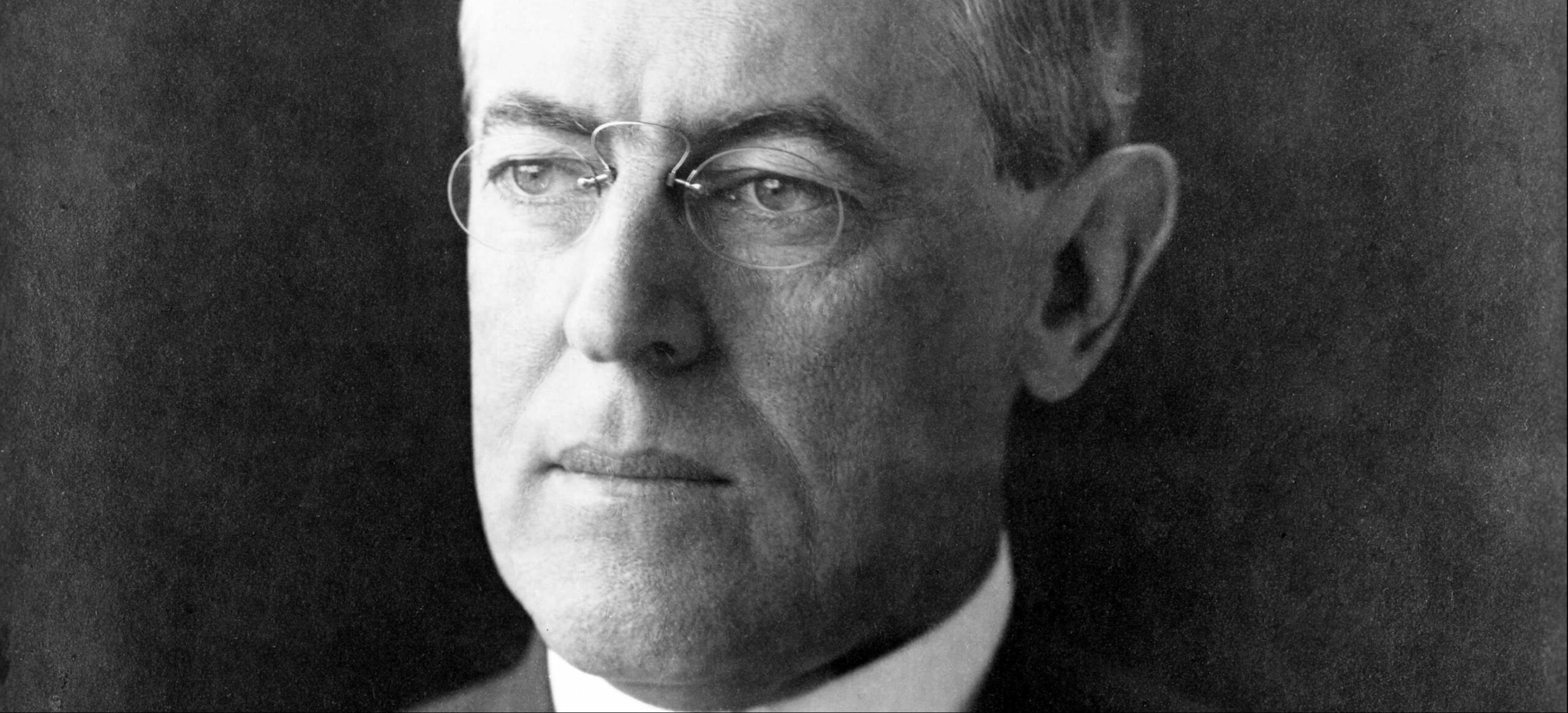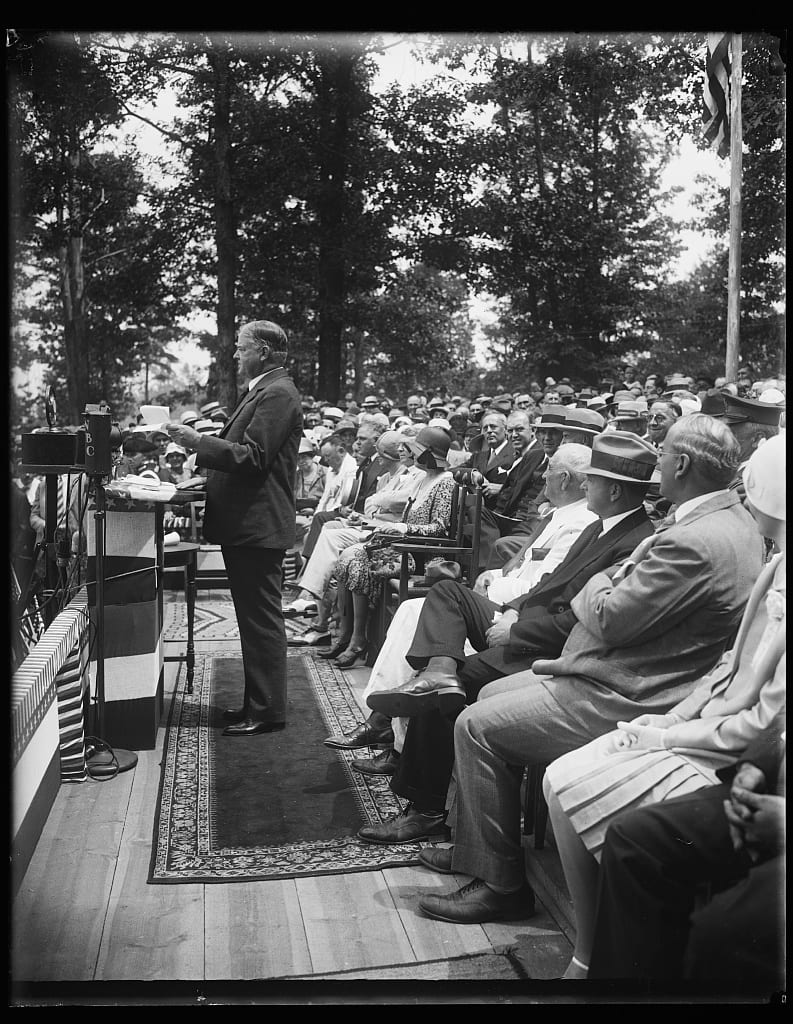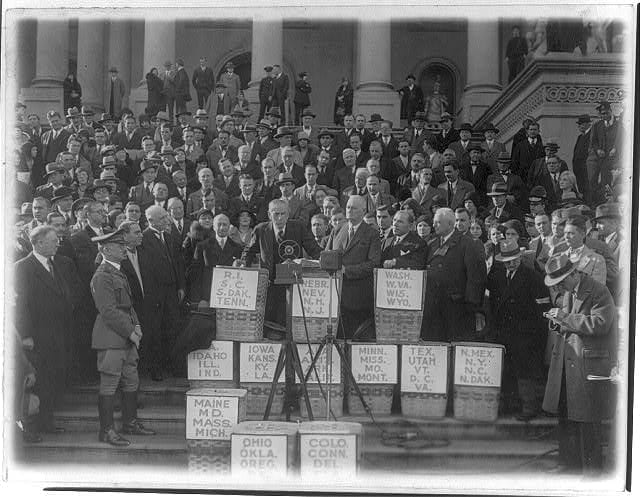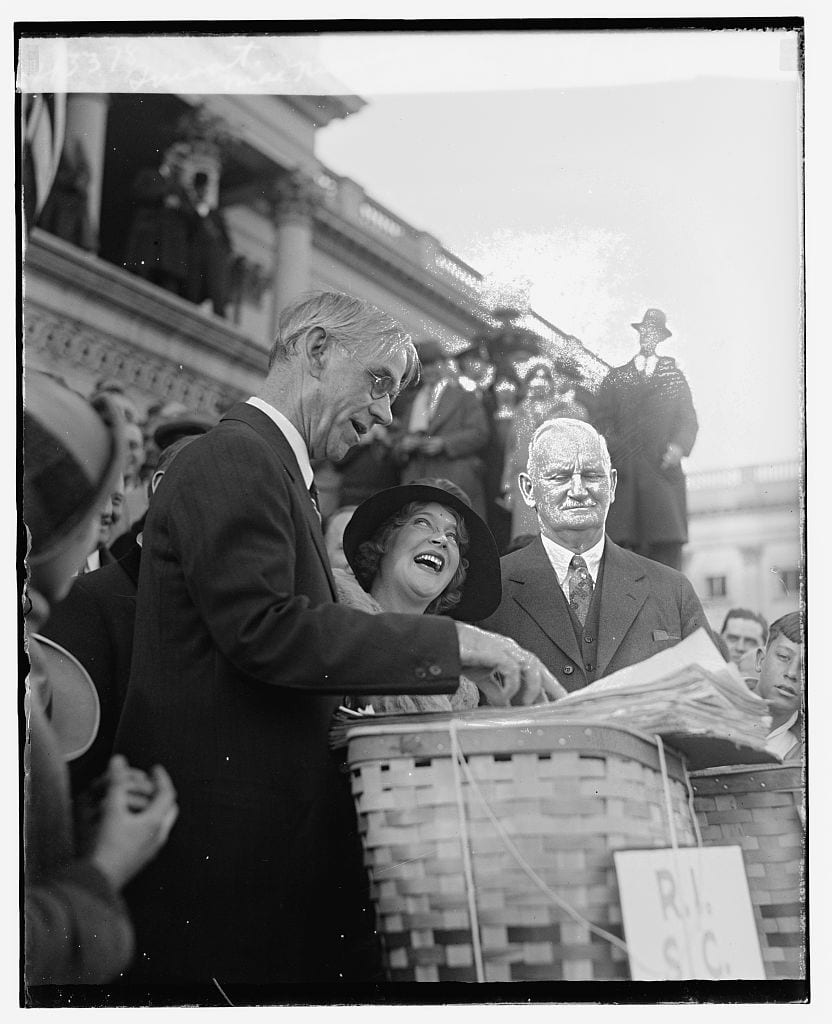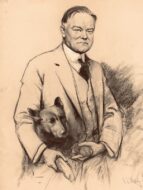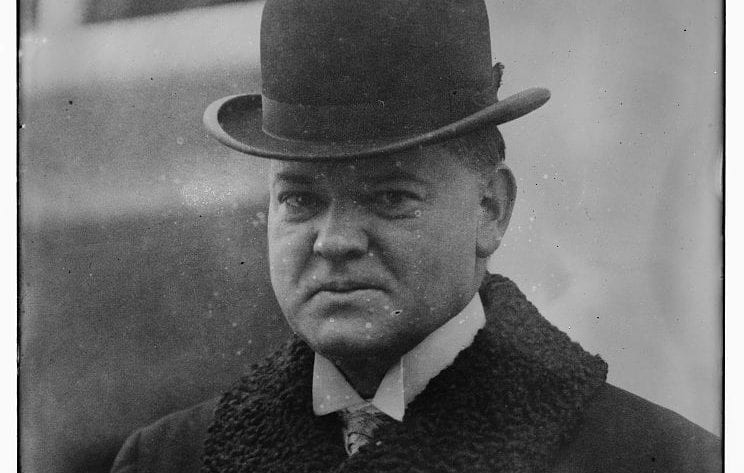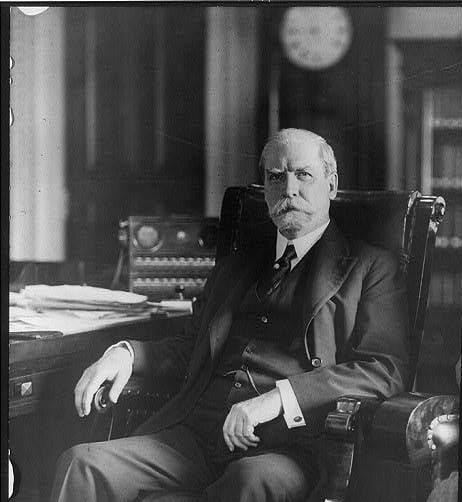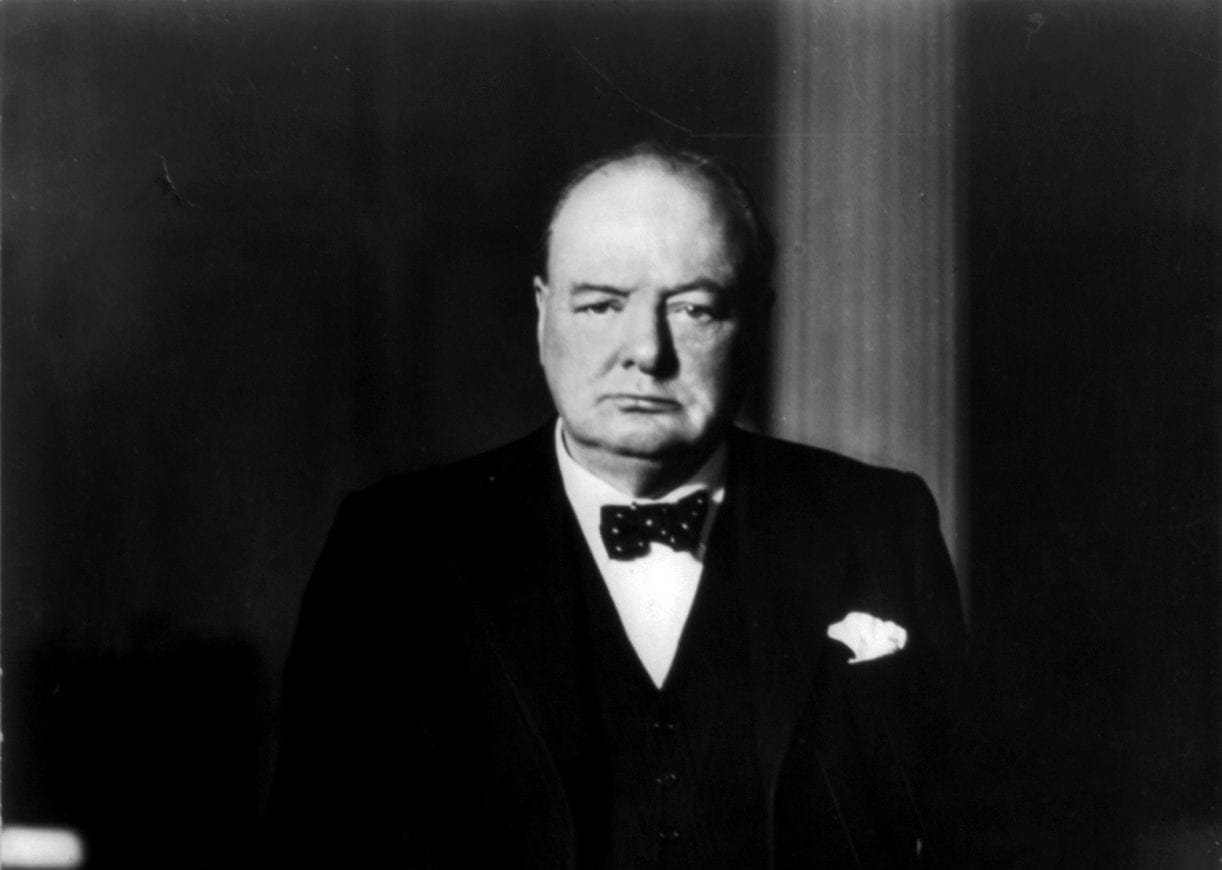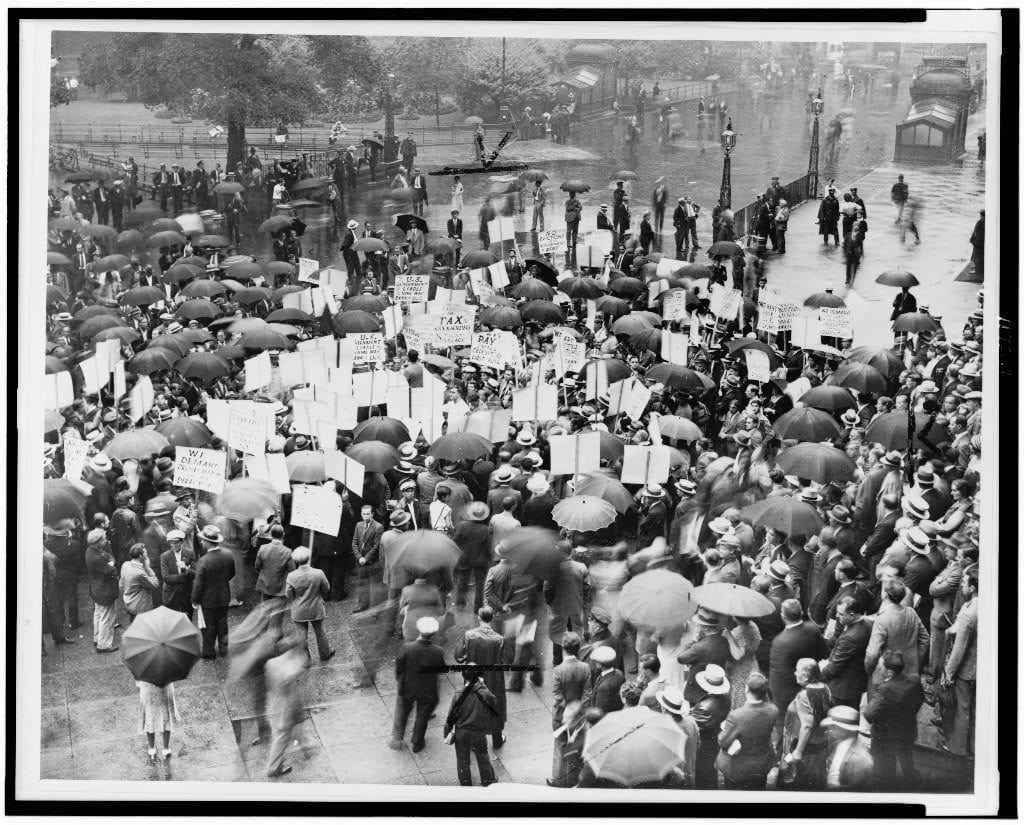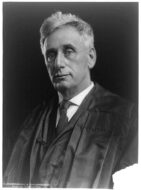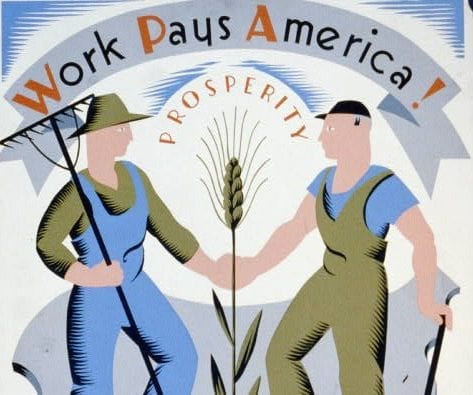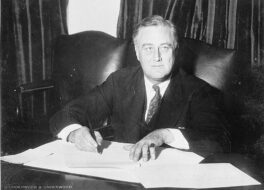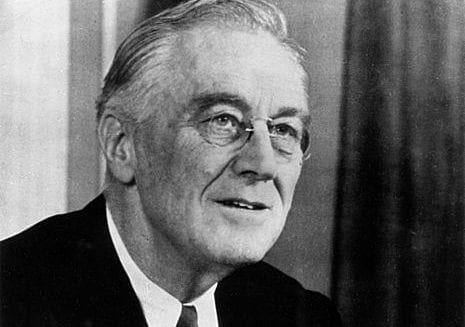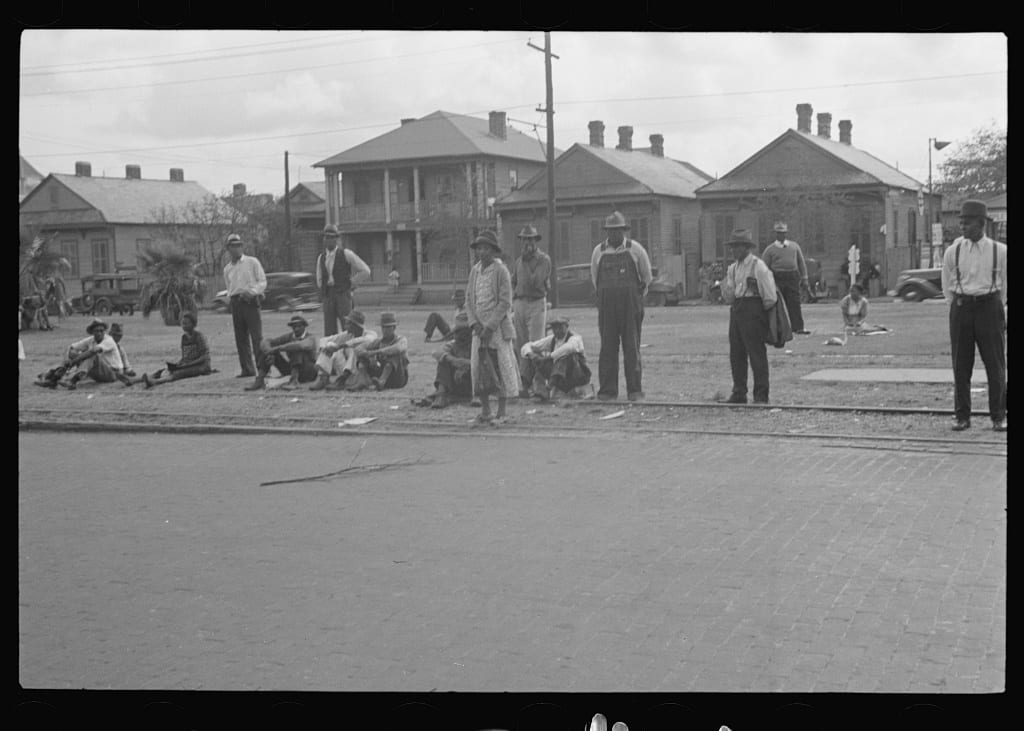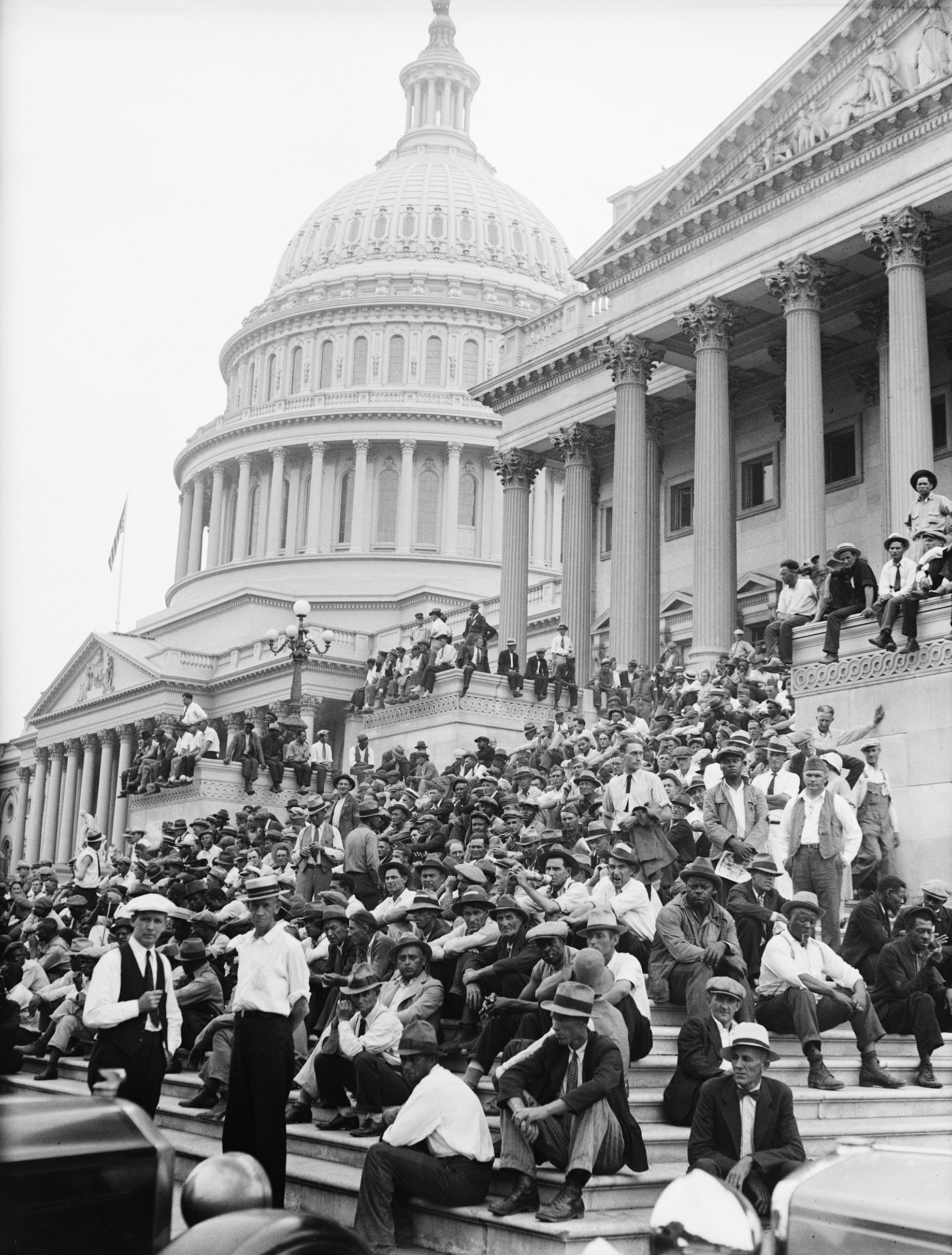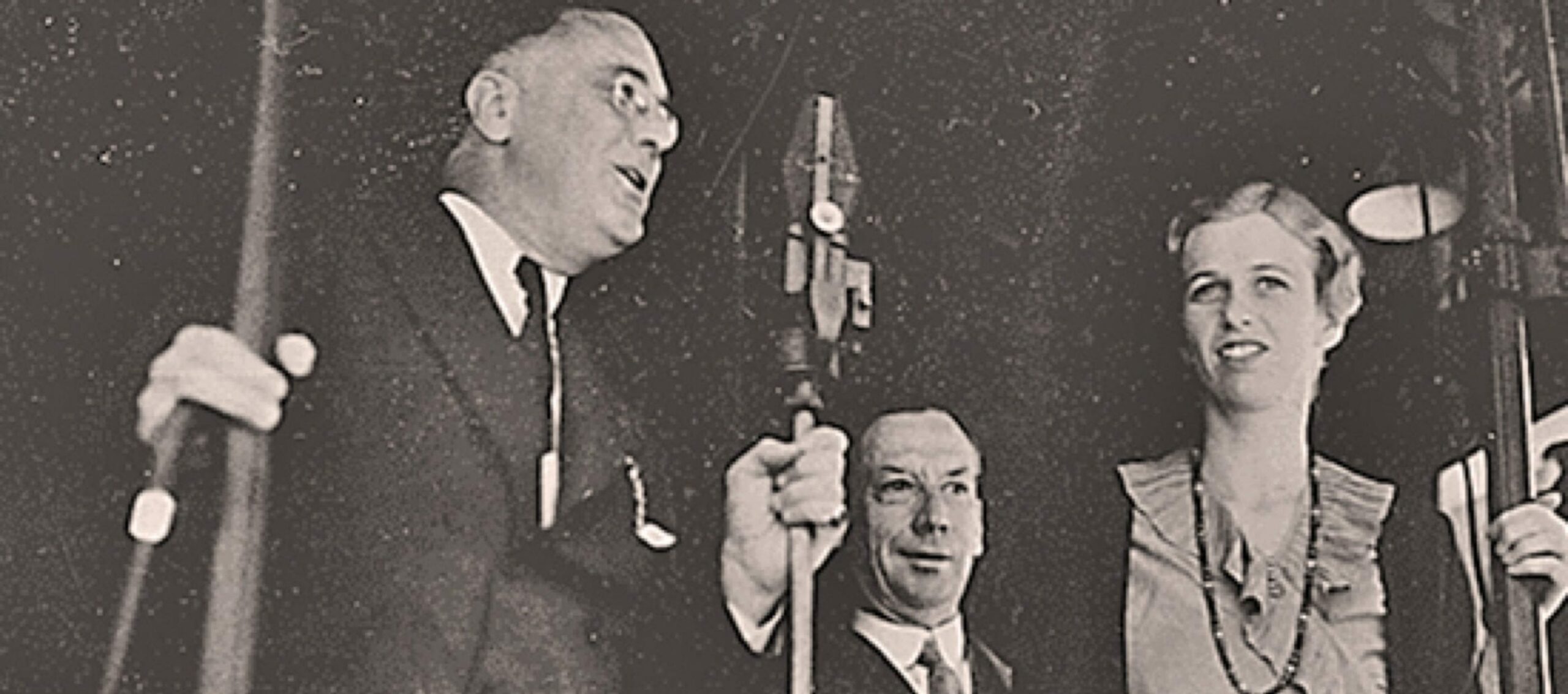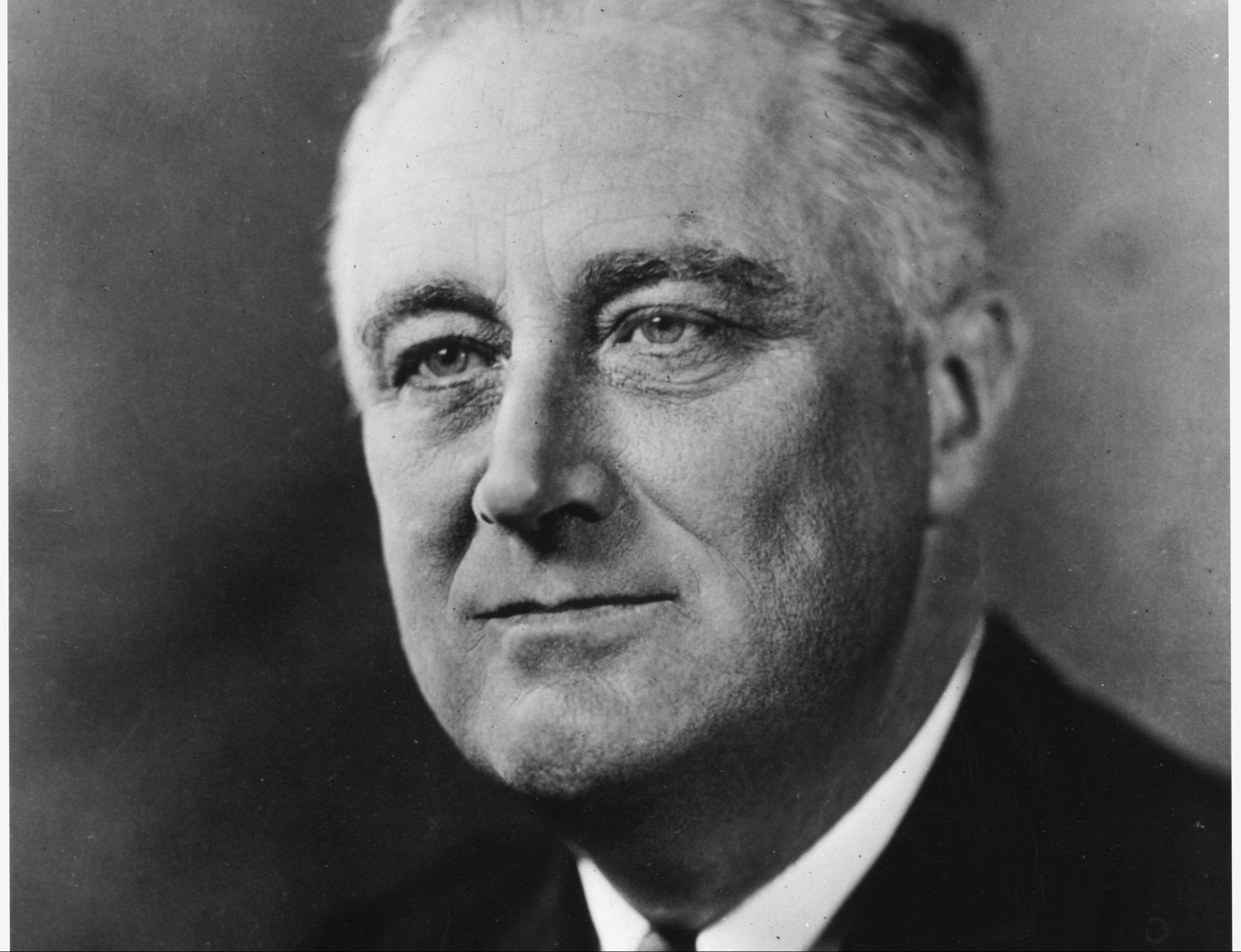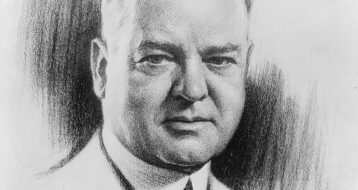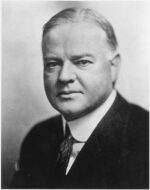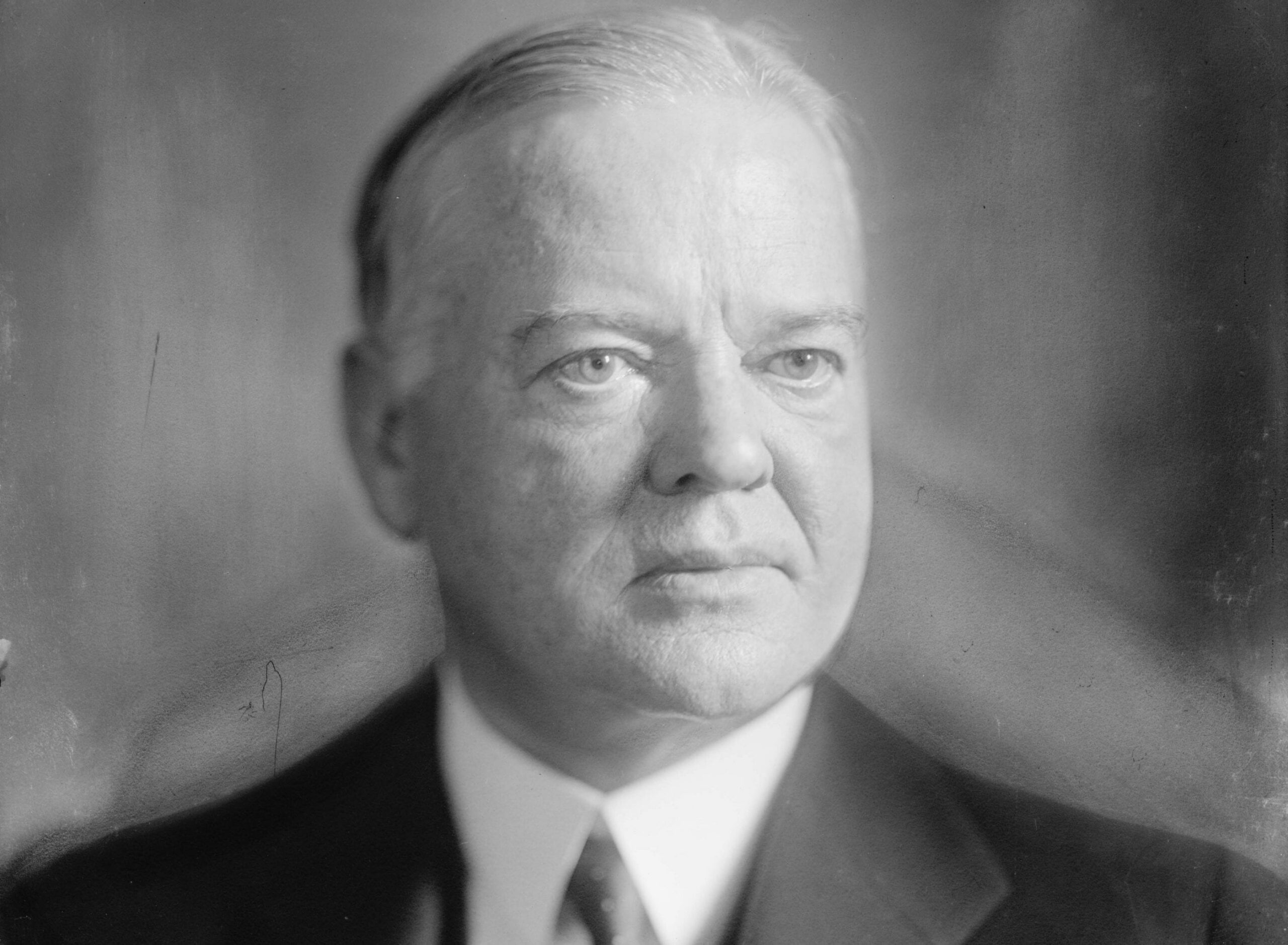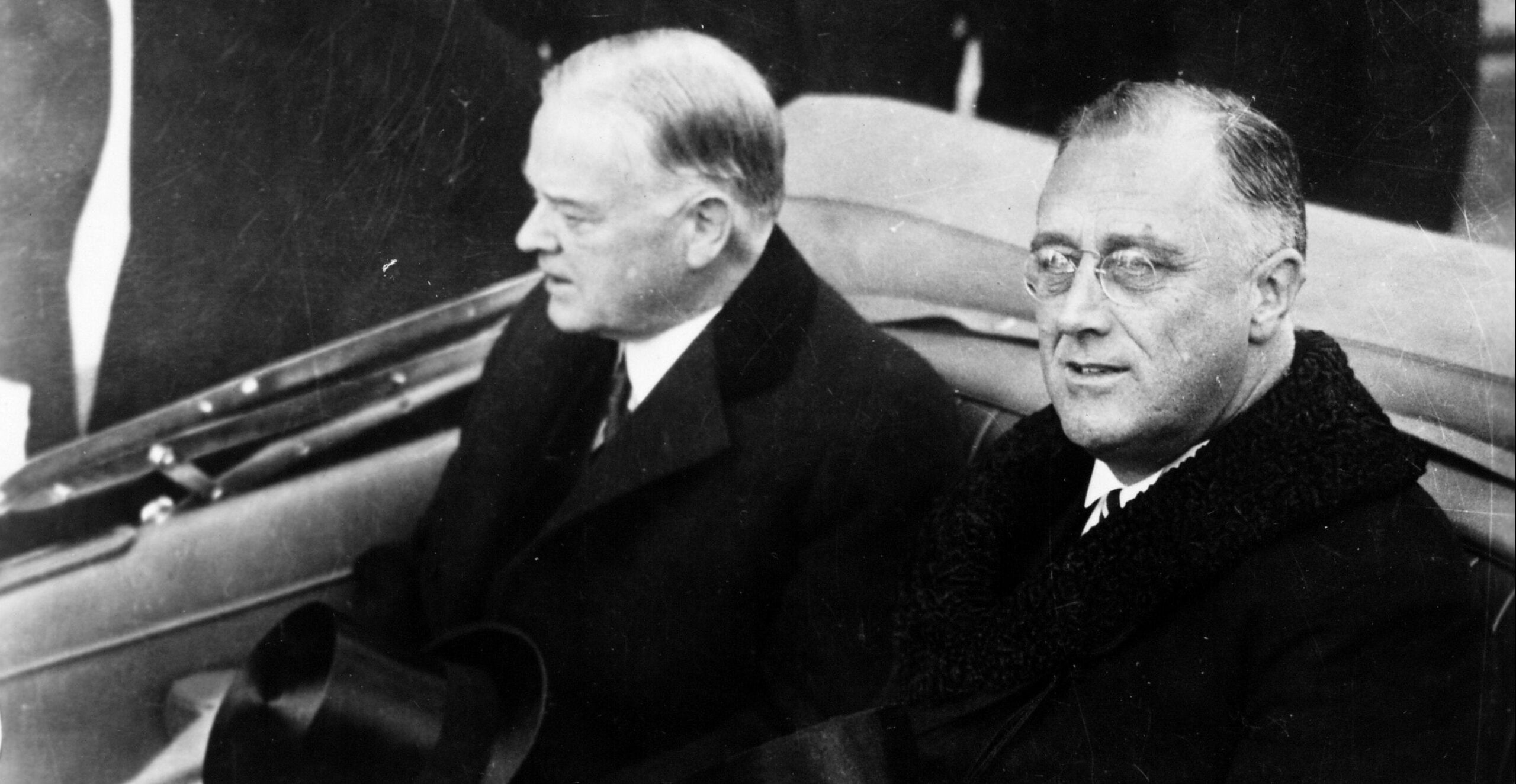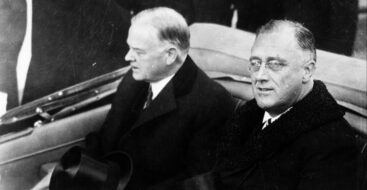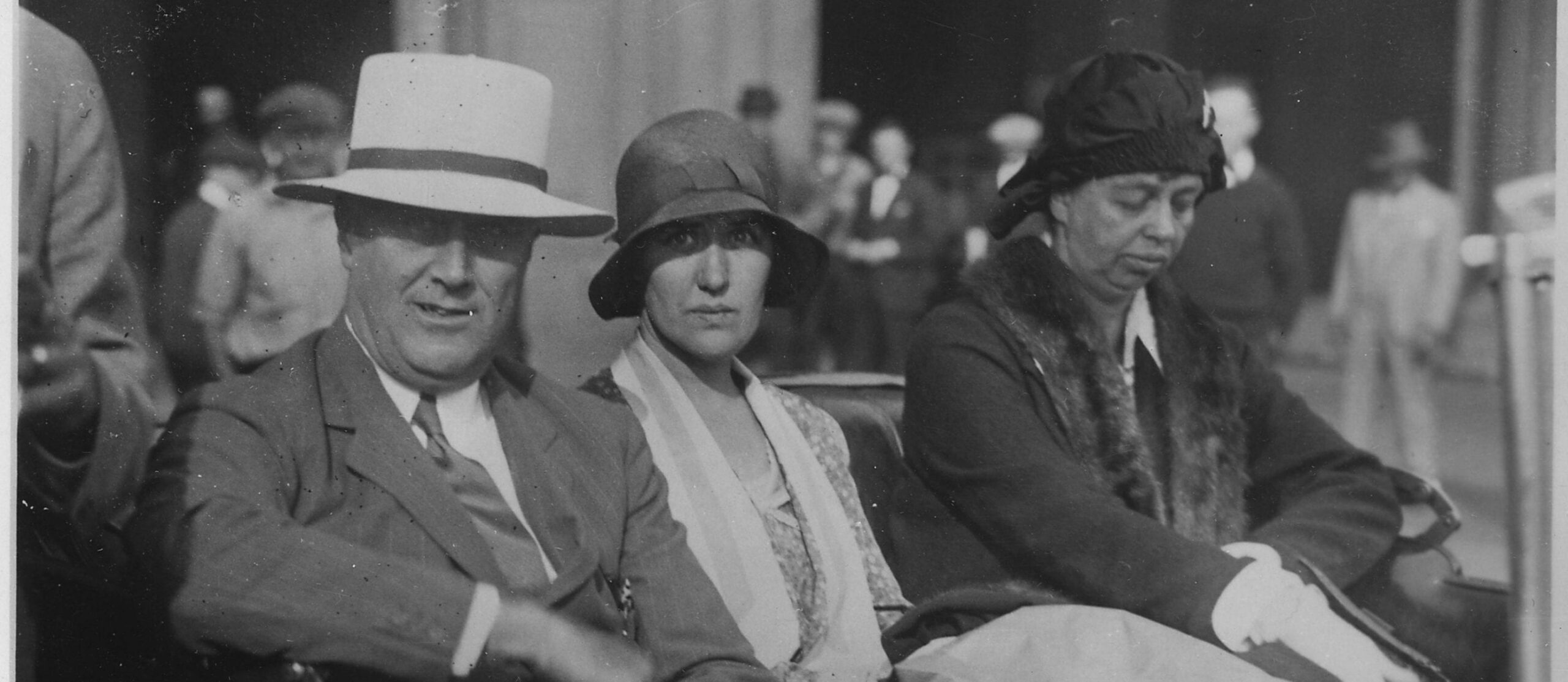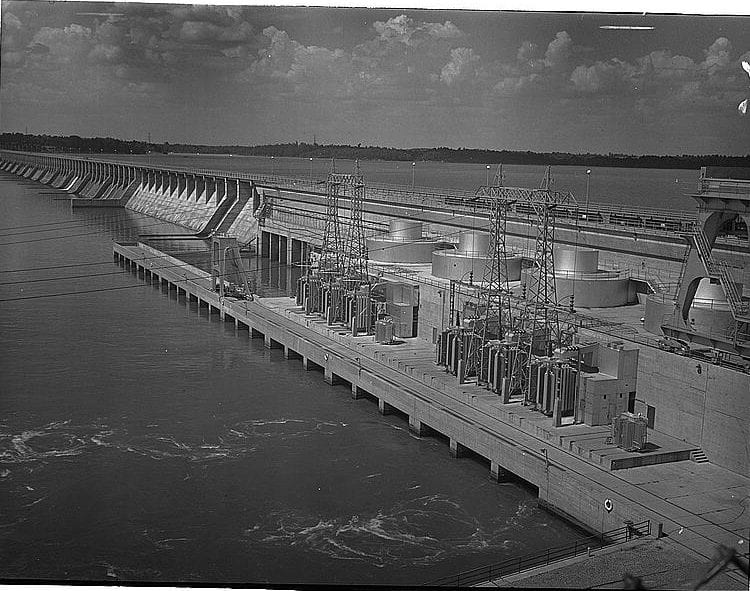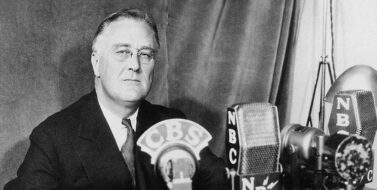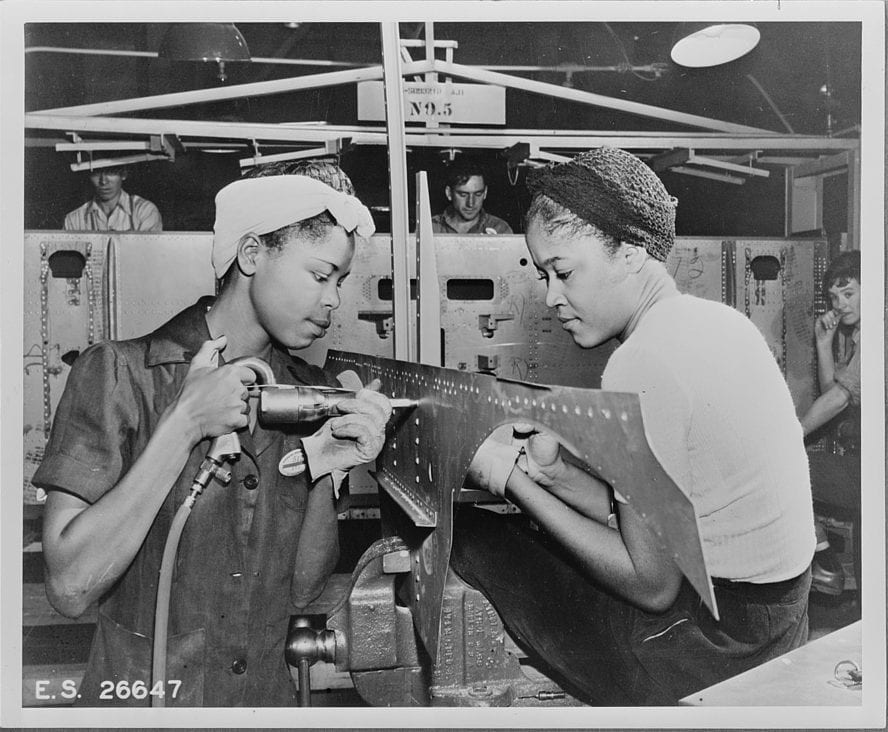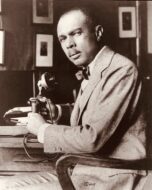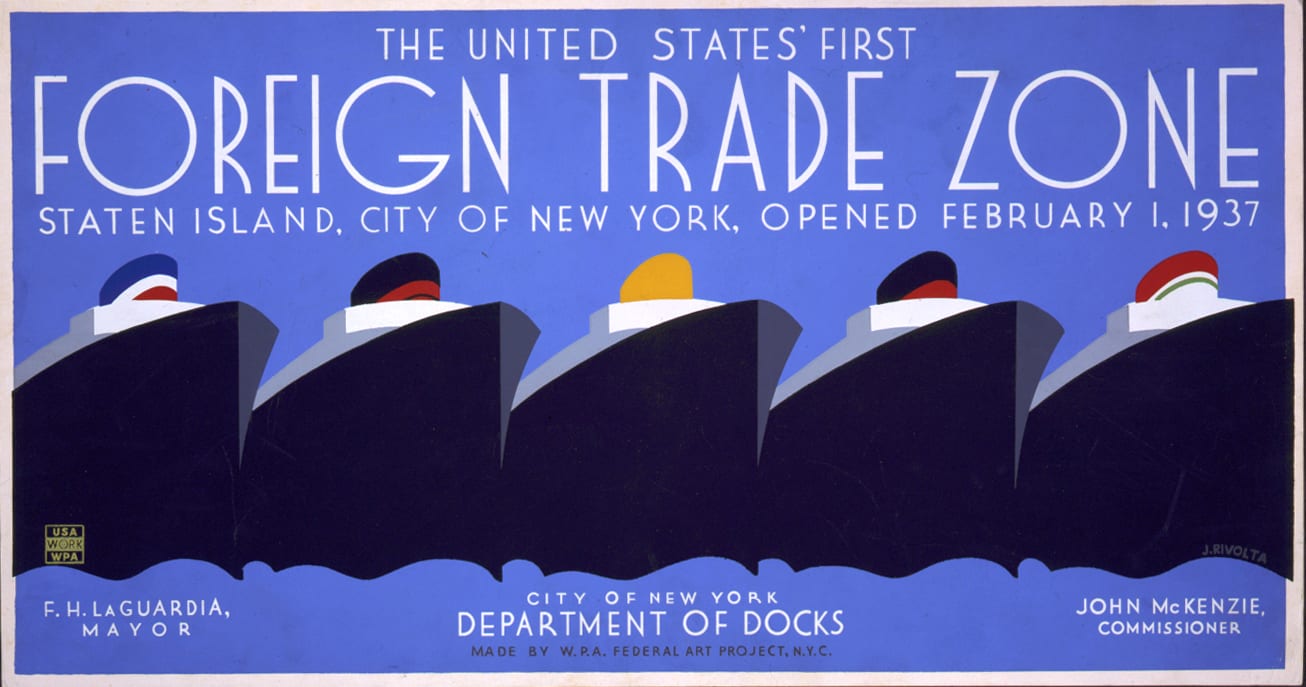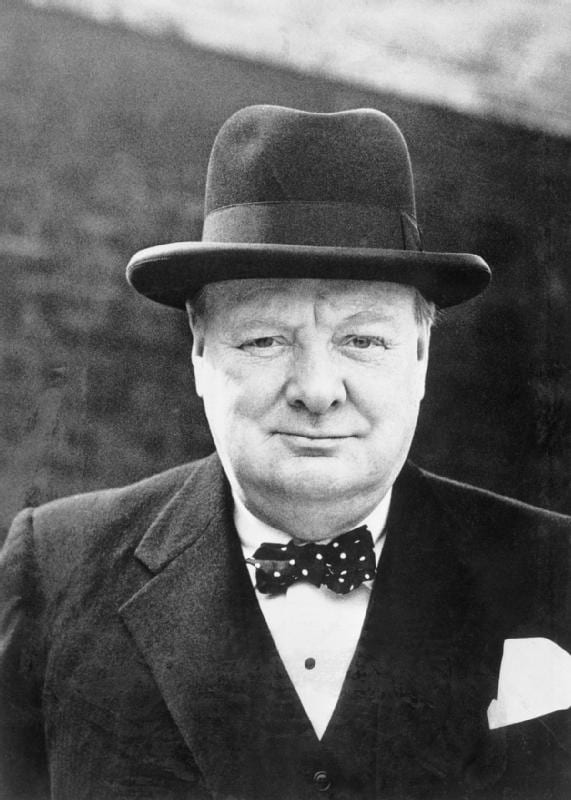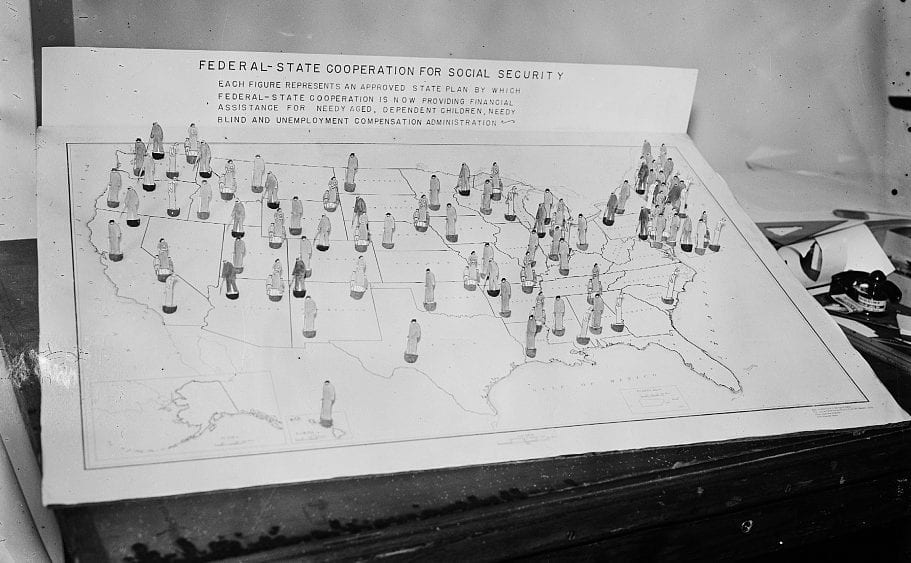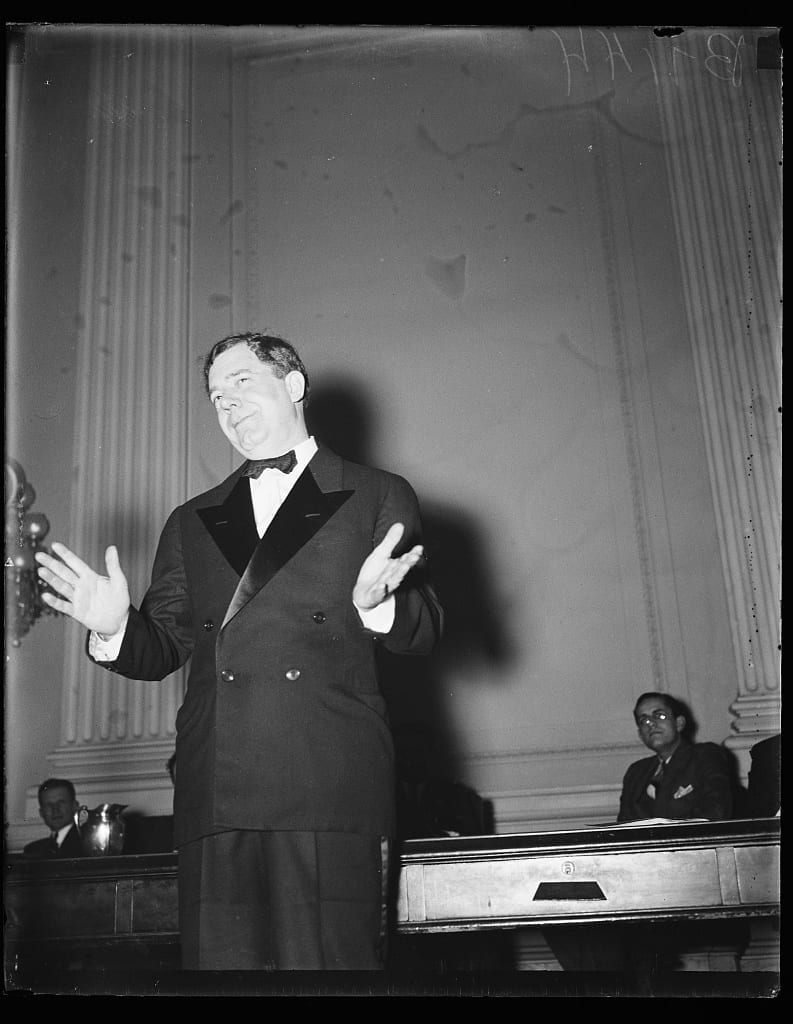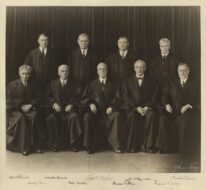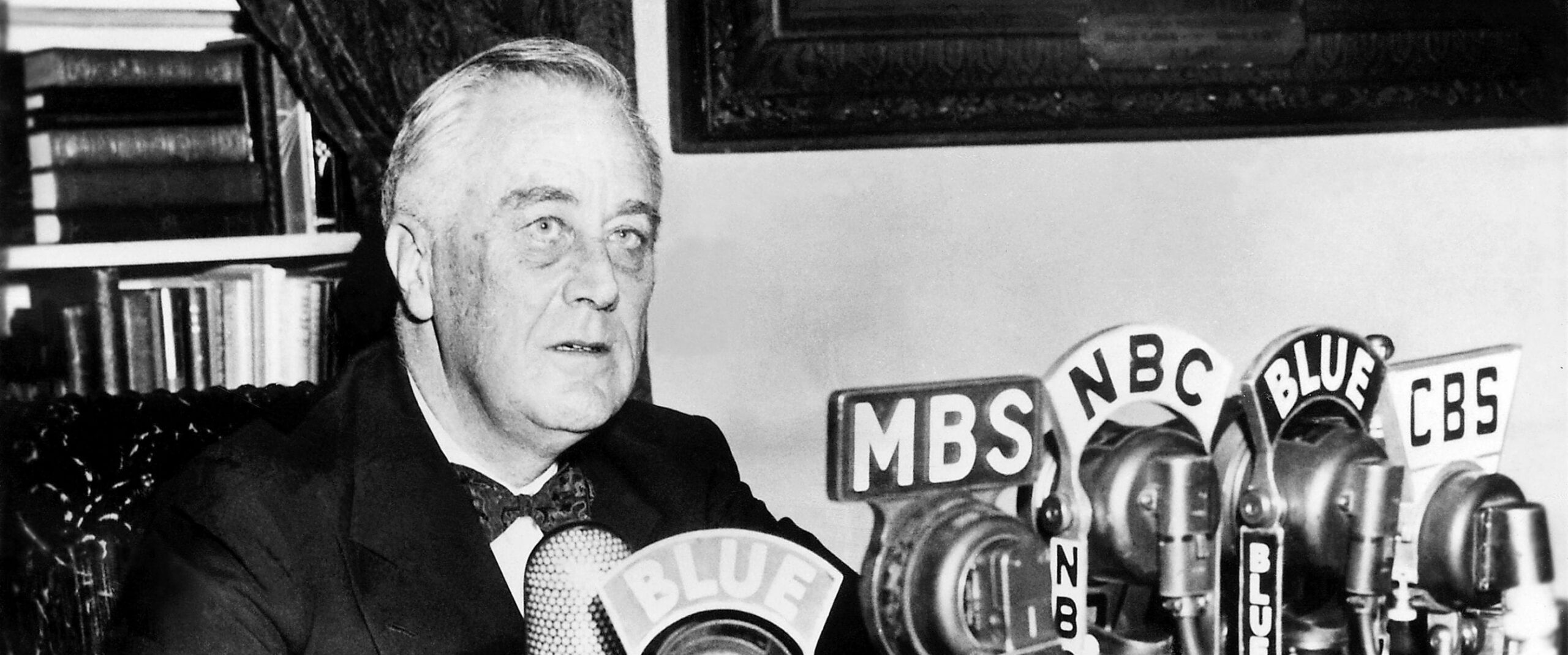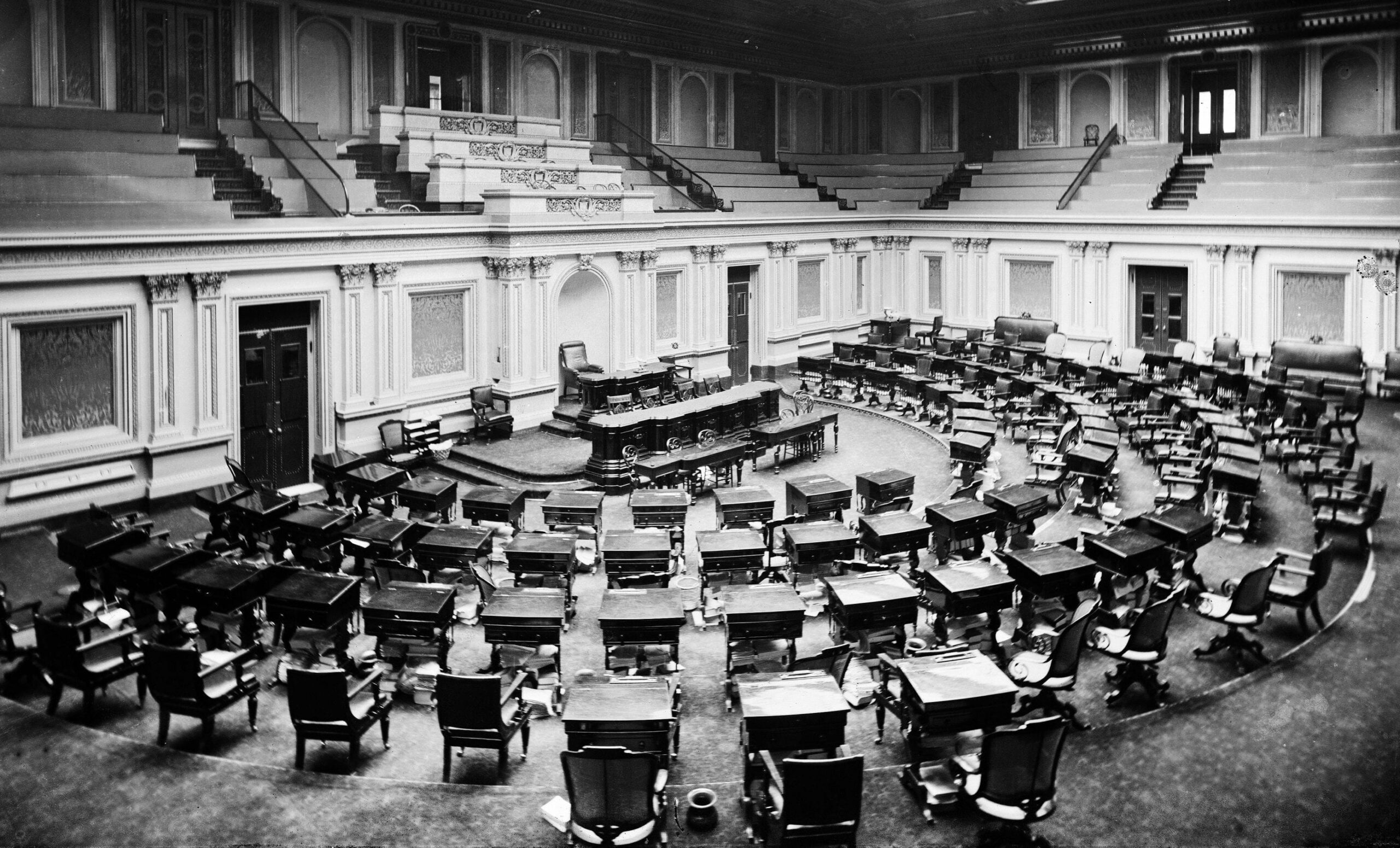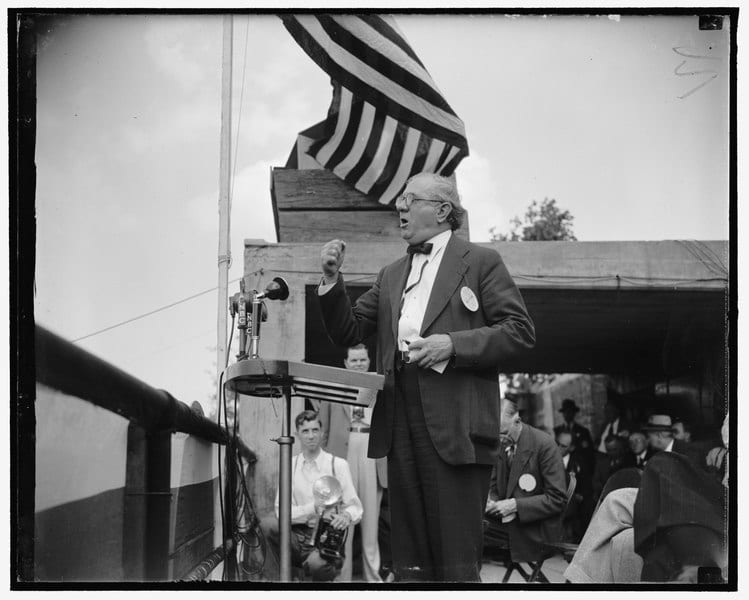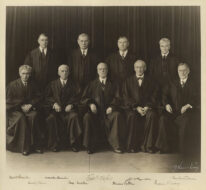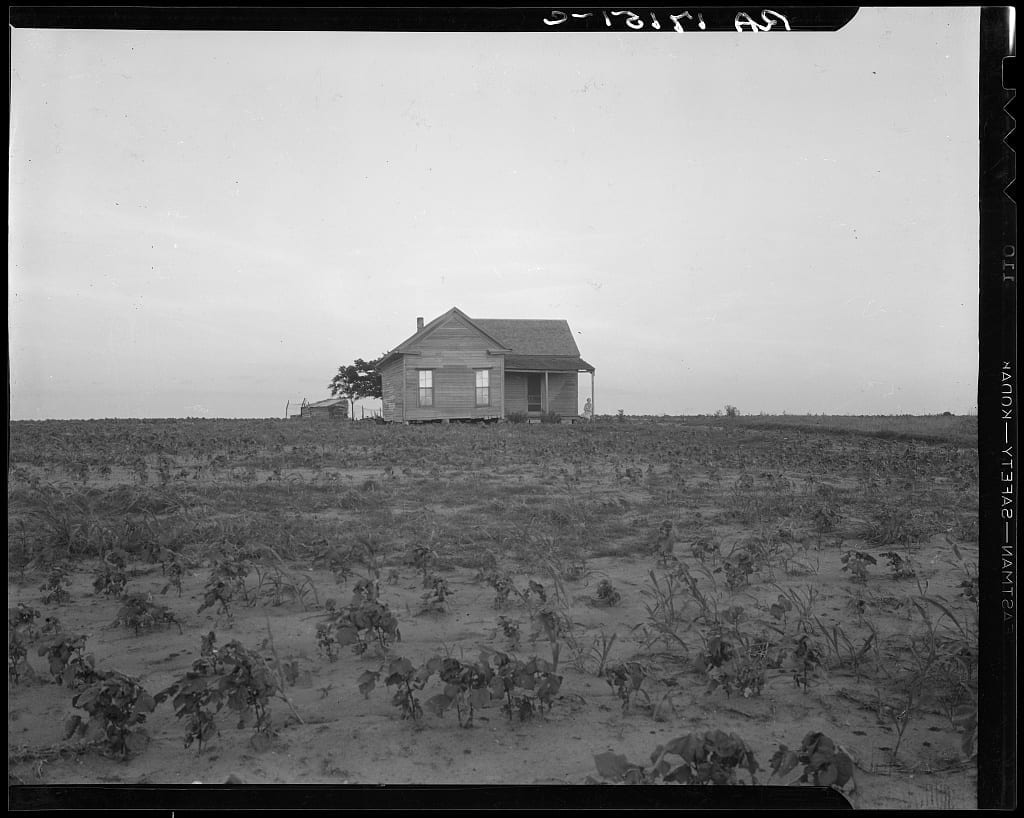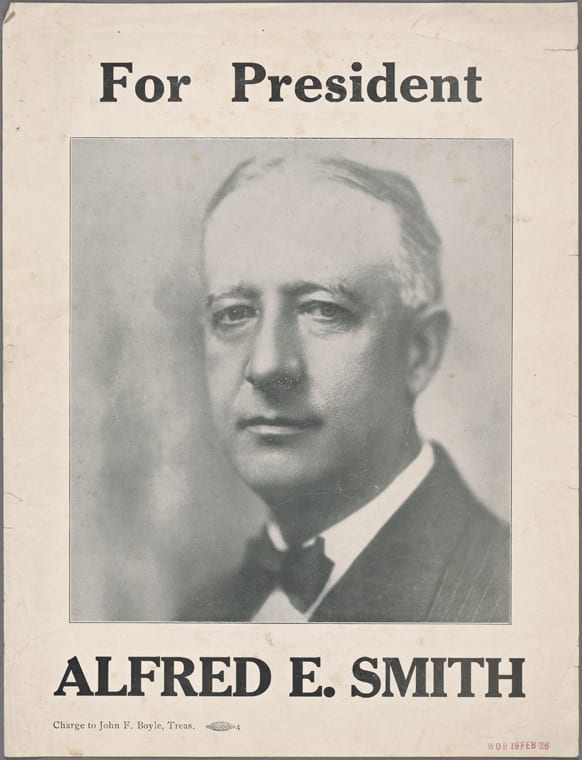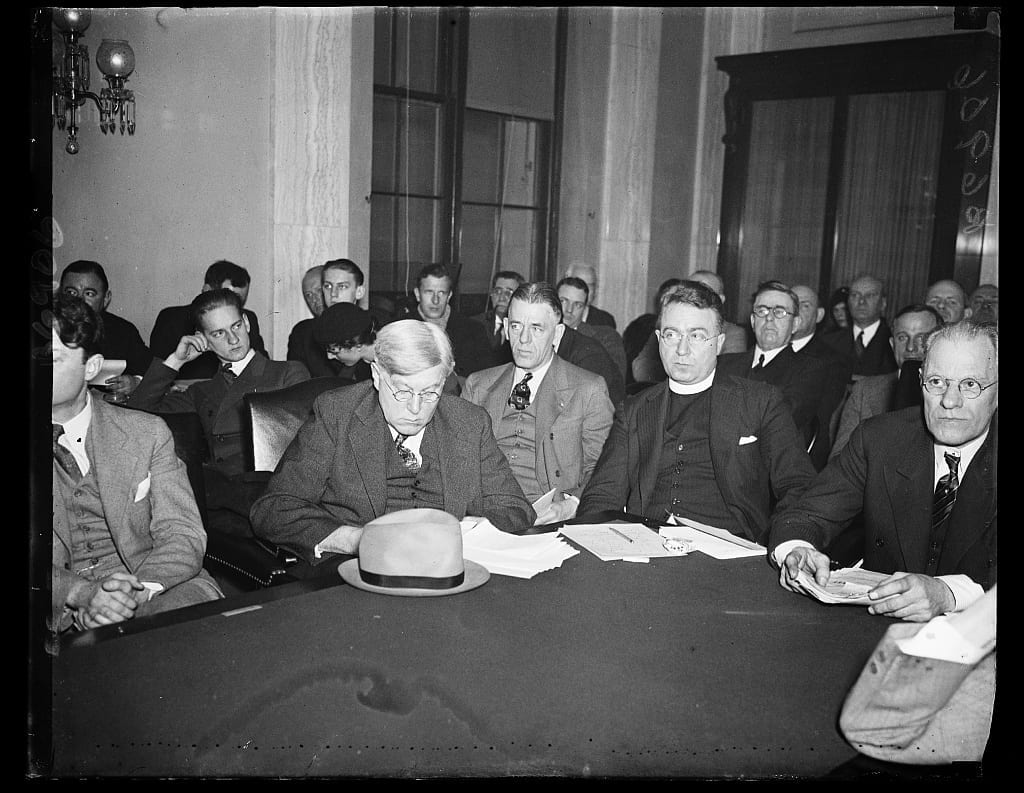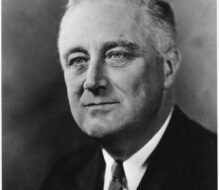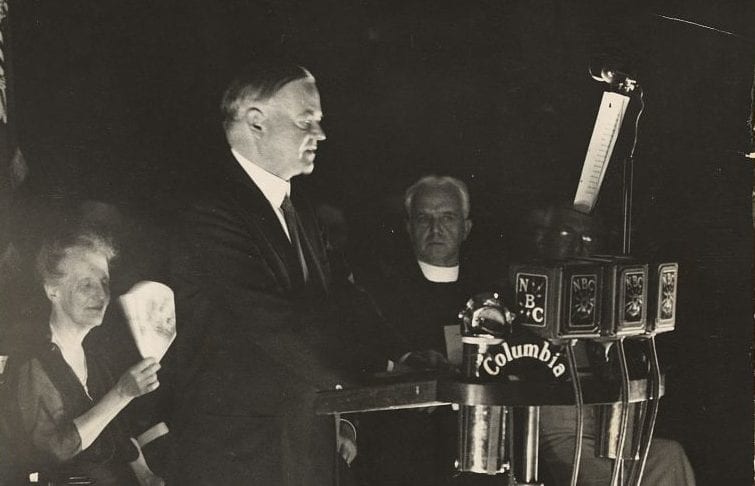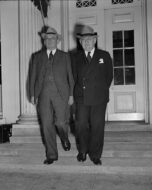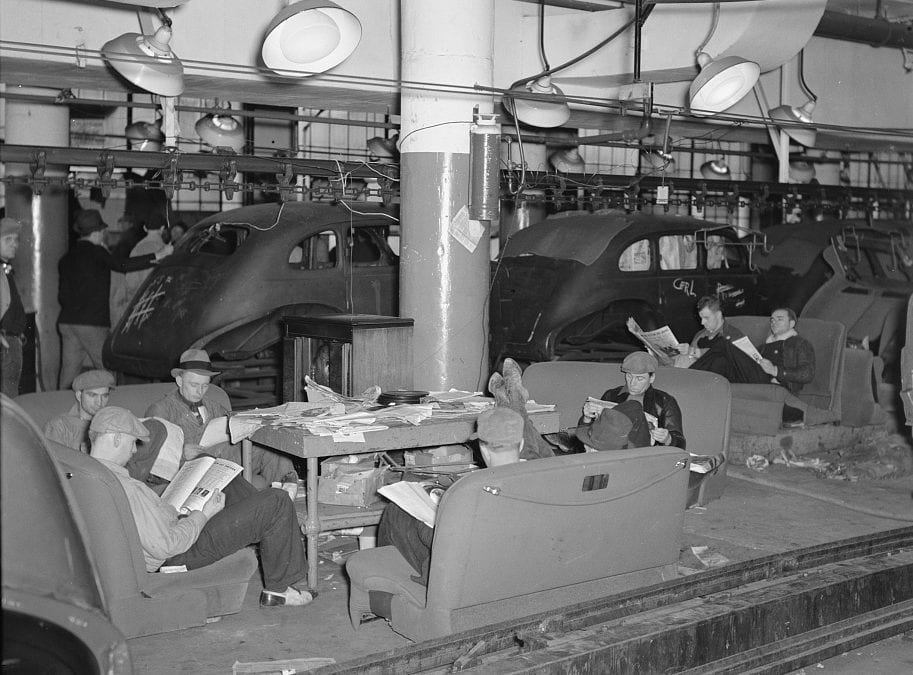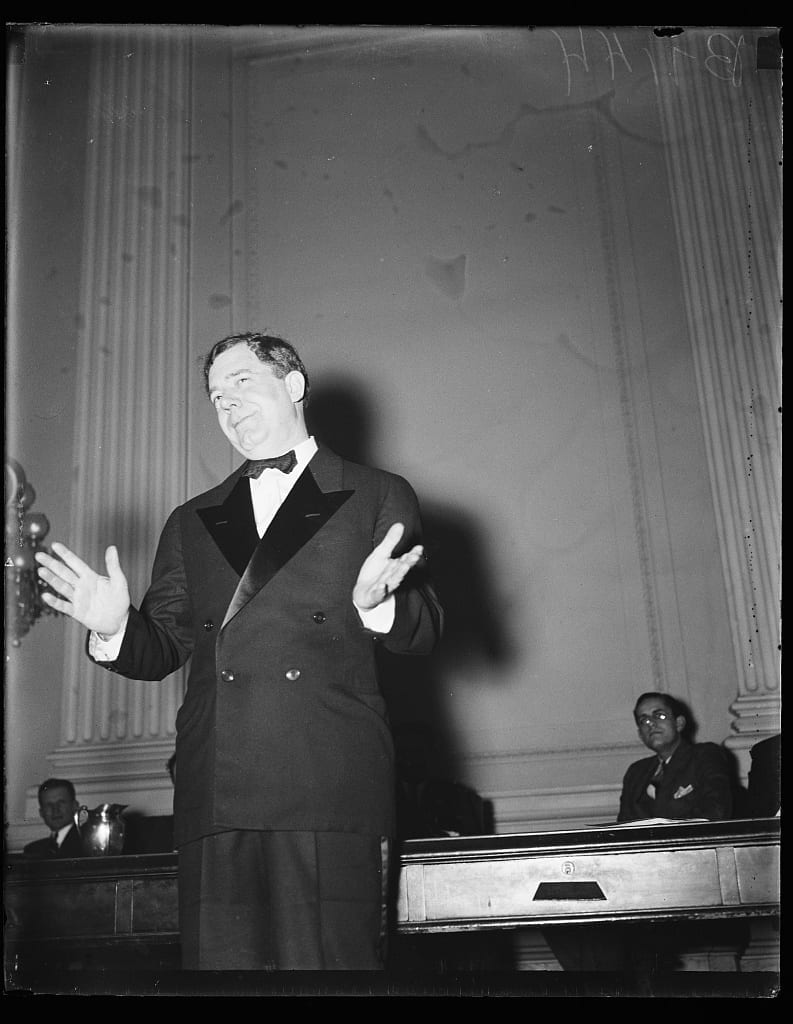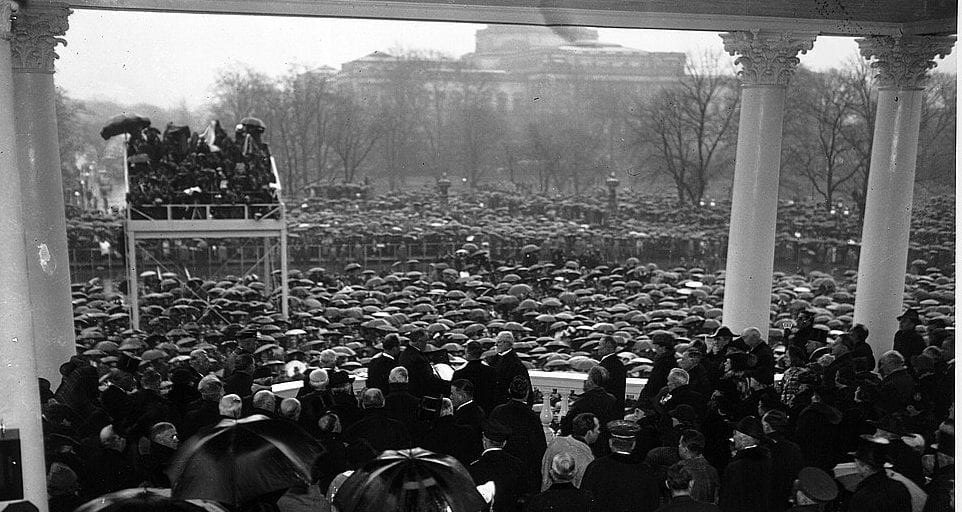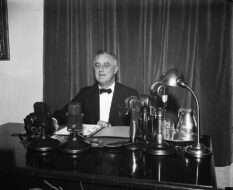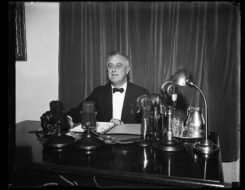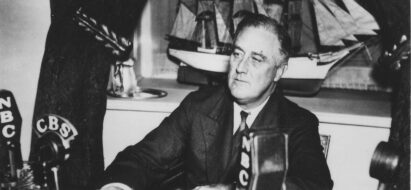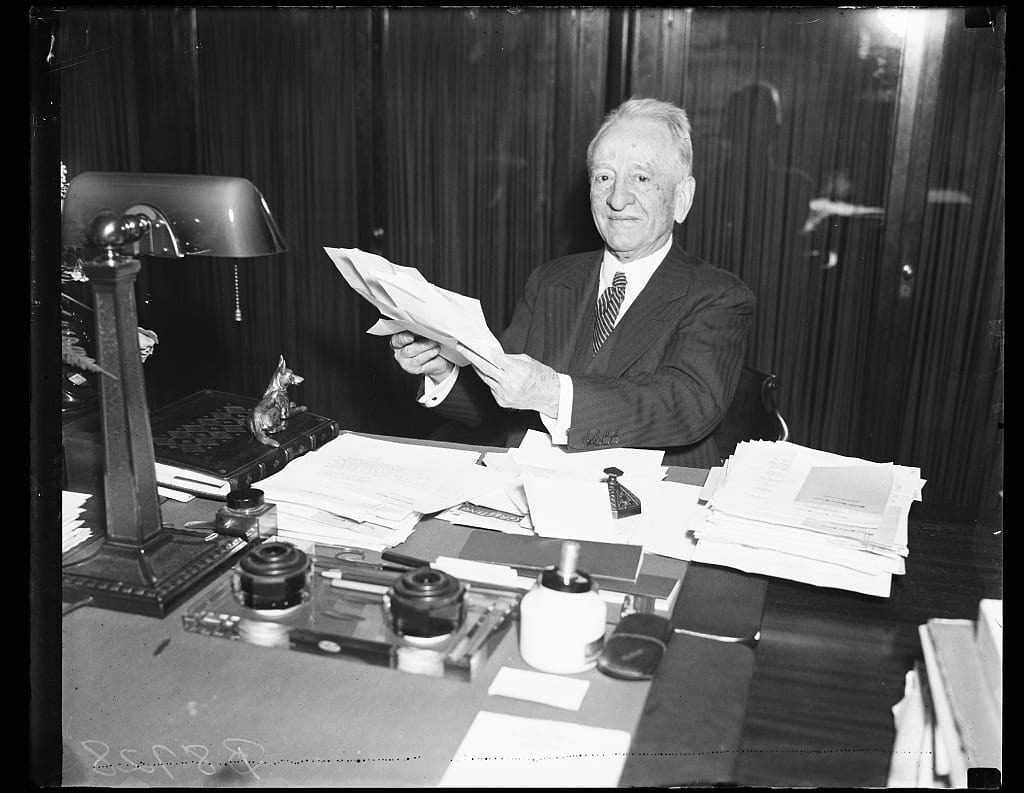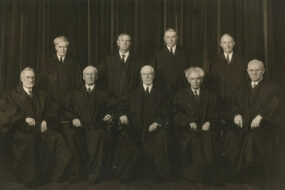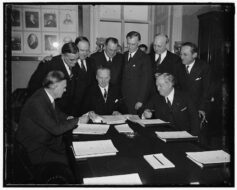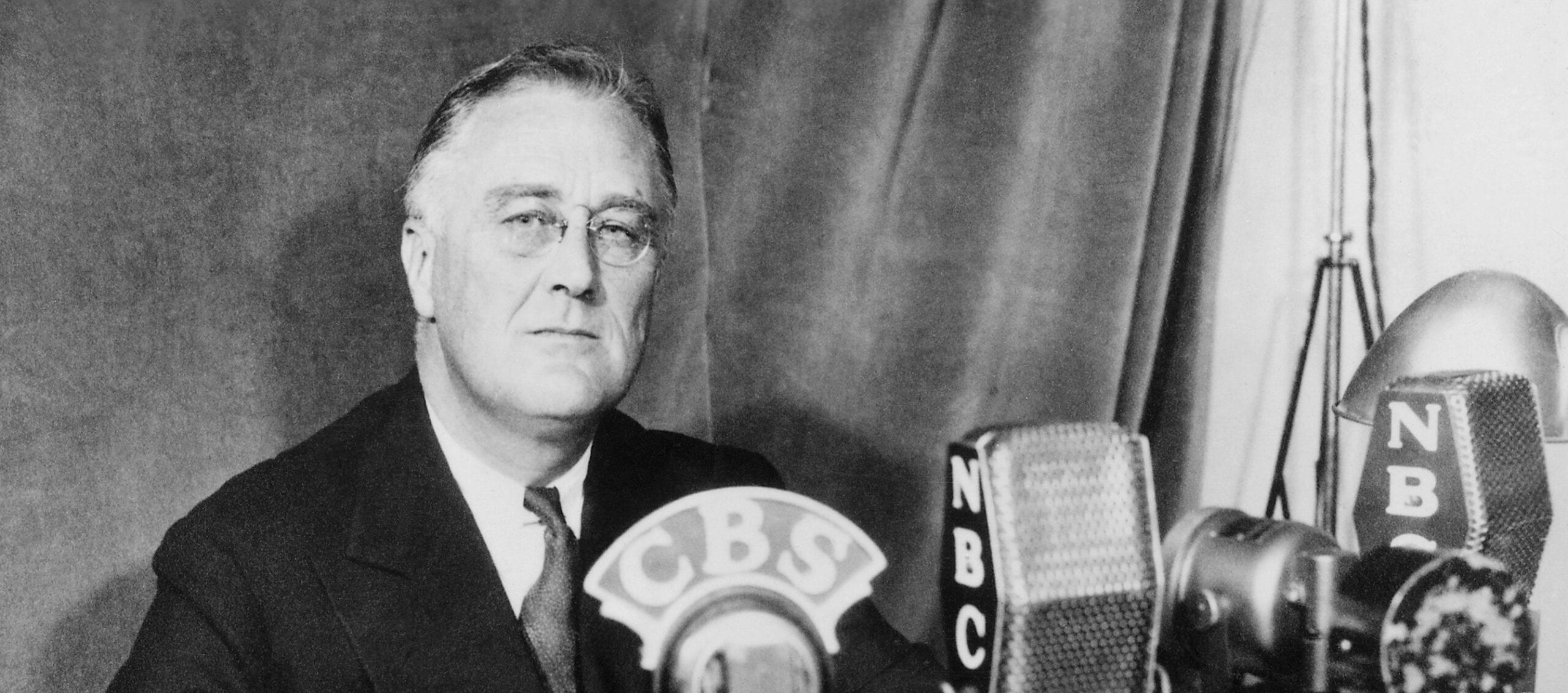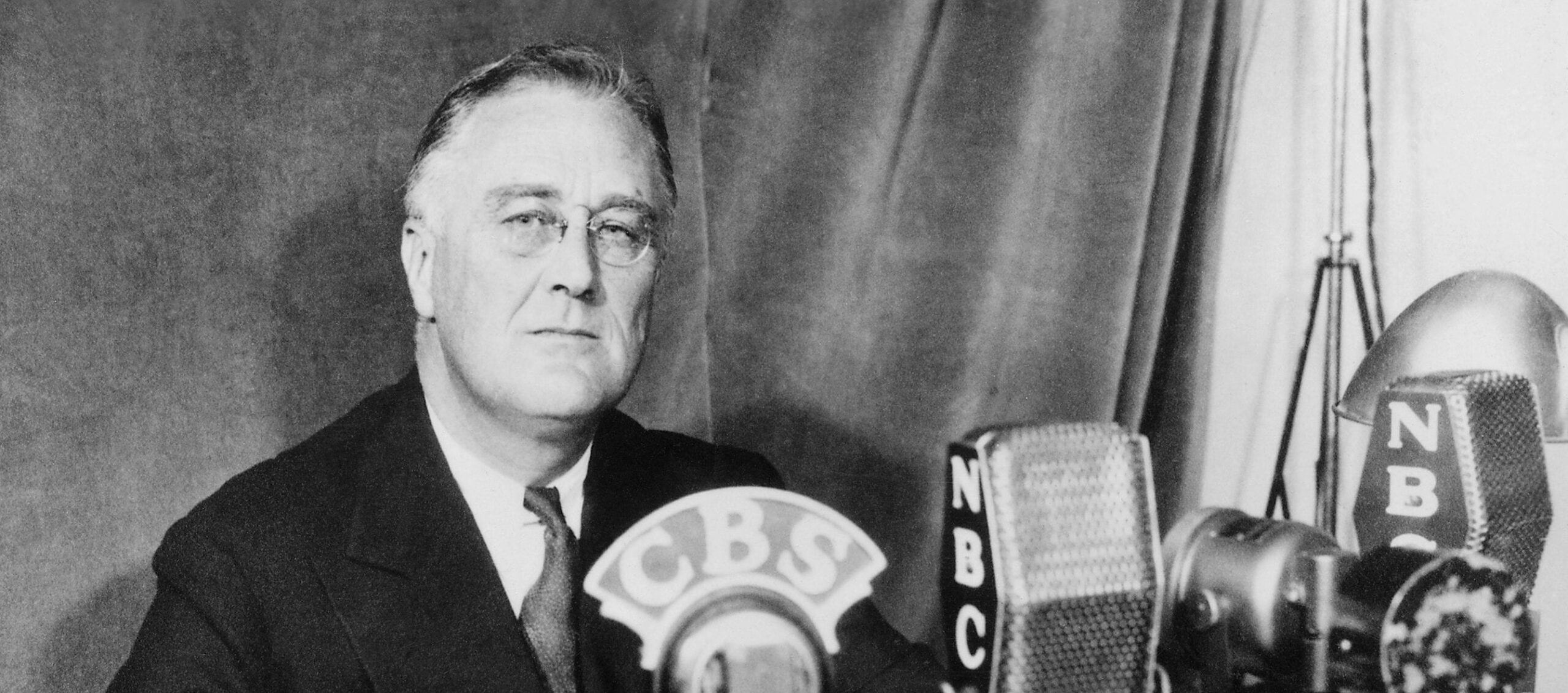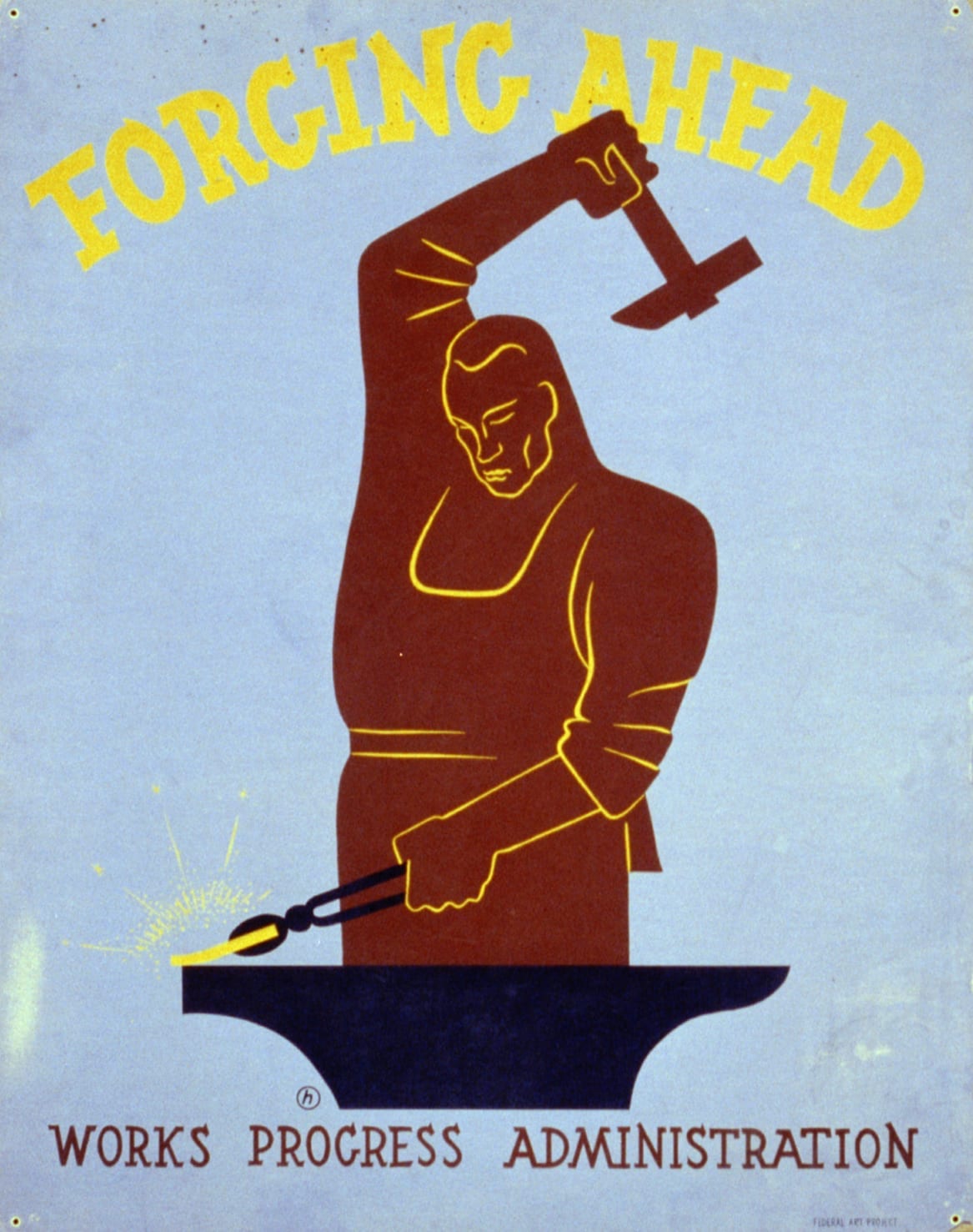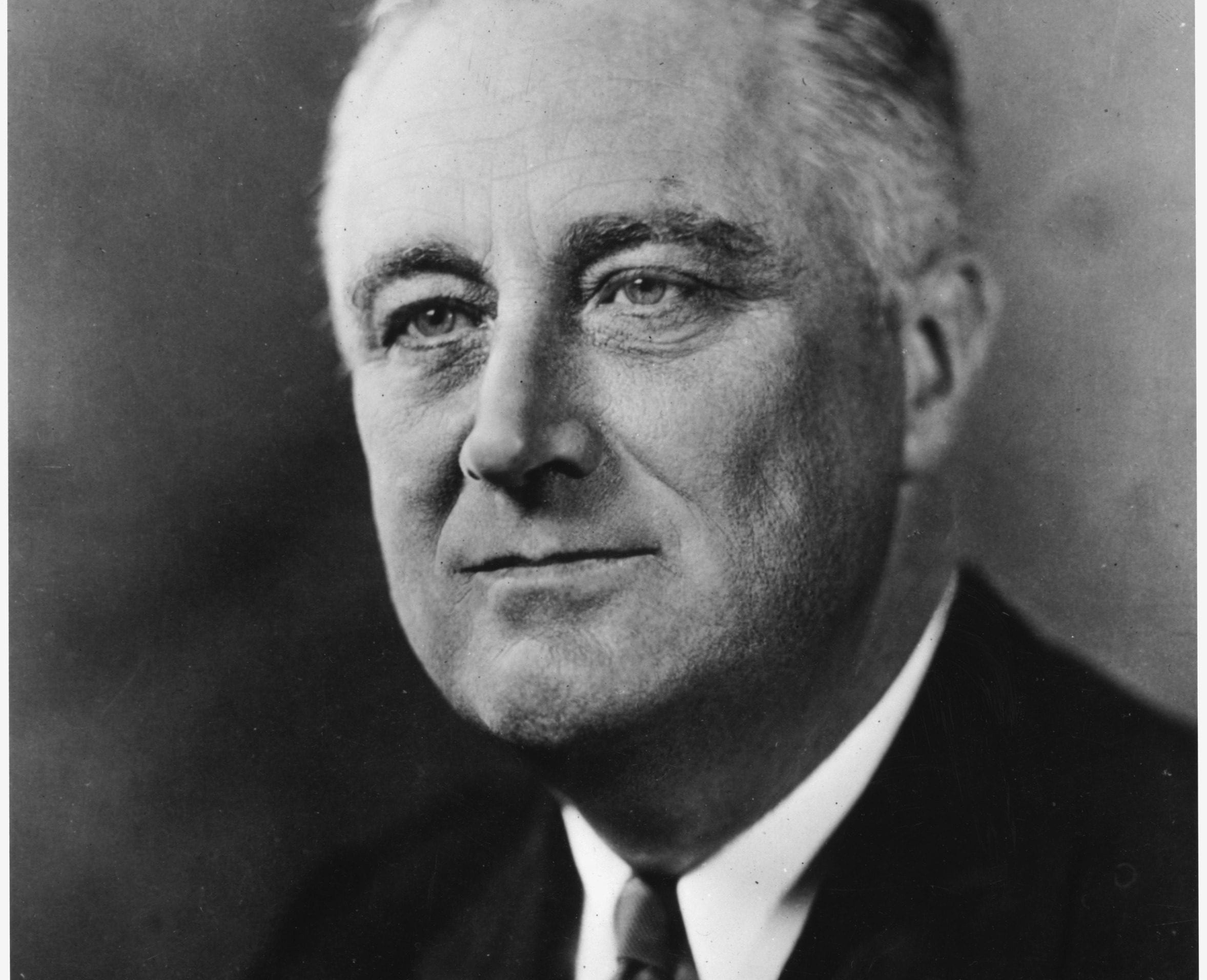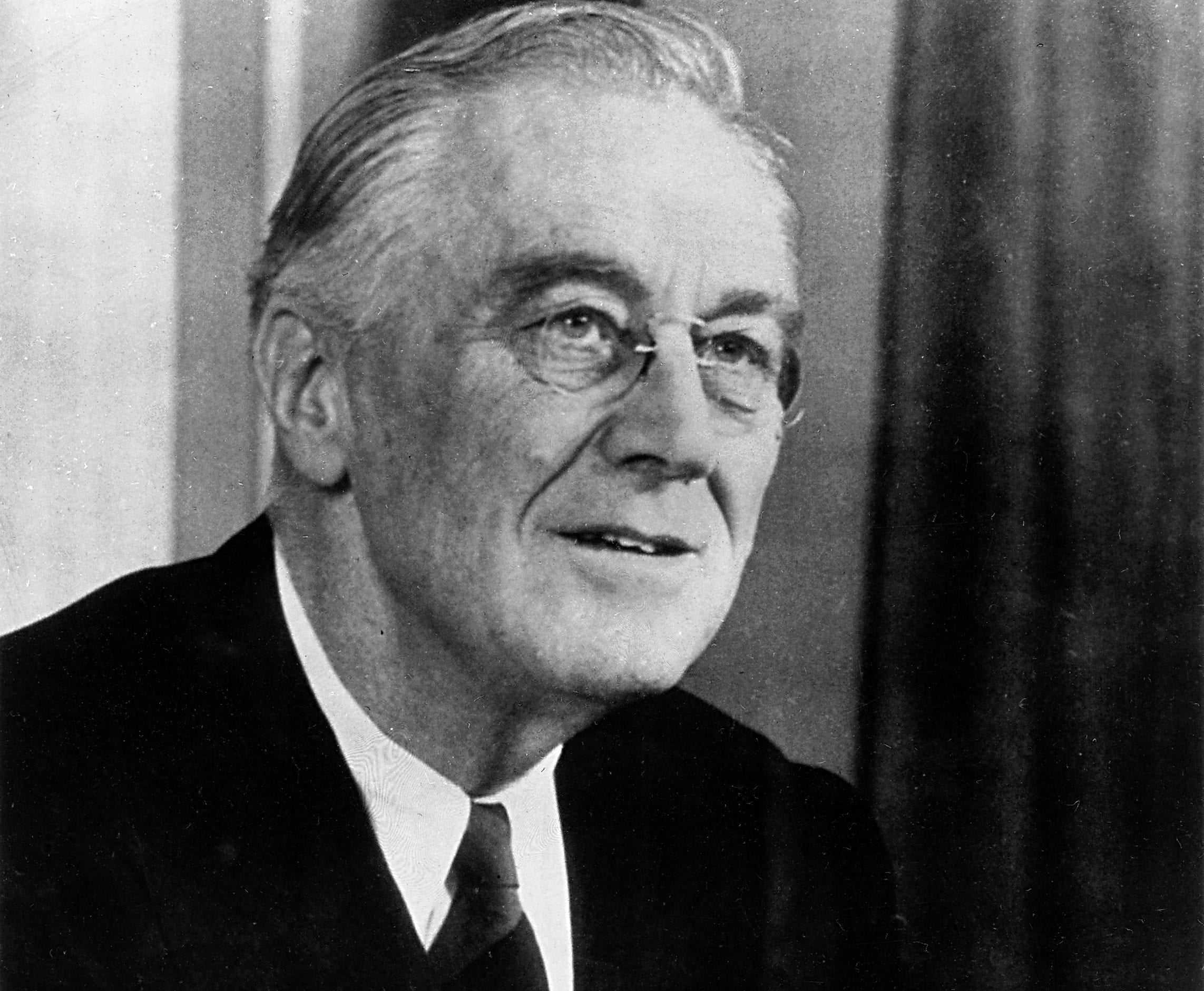
Roosevelt, Franklin D., Master Speech File, 1898-1945, Box 11. Franklin D. Roosevelt Presidential Library and Museum. http://www.fdrlibrary.marist.edu/archives/collections/franklin/index.php?p=collections/findingaid&id=582&q=&rootcontentid=246681
The great warmth of your welcome reenforces the obvious fact that so far as carrying on a campaign to get votes, my visit to this State has not been necessary. However, the purpose of coming down here is not to get votes. My visit to the South is to carry out the purposes of my trips to the West, to the Coast and indeed throughout the country, which is not so much to be heard as to hear, and not so much to talk to you as to let you talk to me. It was only natural that in coming to the South I should have as an additional objective a visit to Warm Springs where I have spent so many hours and where I have had the good fortune to make so many friendships that I shall always cherish through life.
I want to know about the problems of all of this country, east and west and north and south, and for that reason, familiar though I am with conditions in this State, I have come to my second home, my home in the Southland.
Because of the growing importance of the attitude of members of the United States Congress, it is particularly pleasing that tonight we have at this gathering a dozen Democratic members of the United States Senate coming from various sections of the country, and so many of the most efficient members of the House of Representatives.
I want to thank them for the generous interest that has prompted their presence because I believe that the Executive can never accomplish a program in behalf of the American people without the cooperation, the wholehearted and sympathetic cooperation of the members of the Senate and the House, and it shall ever be my purpose to confer with them and secure their cooperation. Let me suggest to you that after the 4th of March next there will be a new deal in the relationships between the White House and Capitol Hill.
I have had the privilege many years ago of serving in a legislative body. In addition, for four years in the State of New York, faced by a Legislature controlled by another party, I have had to meet this problem of the relationship between the Executive and the Legislature. I am confident after the 4th of March next that the American people will find a greater cooperation between these two great branches of government--a better relationship in which not only Democrats but Republicans as well will take part.
I want also to take this opportunity to express my sense of happiness that the State of Georgia, despite the depression, has been making distinct progress. This campaign is long on Jeremiahs, so much so in fact that we are likely to overlook the fact that progress is being made here and there in spite of tremendous obstacles.
This is brought to my mind very sharply by considering what you have done in the State of Georgia in the direction of progress in a sound, common-sense management of public affairs under your fine and progressive Governor, Richard B. Russell.
I should like to take this opportunity to say, loud enough to be heard in Washington, that even in hard times it is possible to have a balanced budget, and Governor Russell has done it; and I want to say further that Governor Russell has done this by cutting expenditures rather than by loading the people with more taxation. And I want to say that loud enough to be heard in Washington too.
And I want to say also, loud enough to be heard in that section of Washington in which the White House and the Treasury are located, that Governor Russell did not wait for a political campaign to start considering how to get within his income.
In spite of the rigid economy practiced by Governor Russell, he has made excellent progress in his State Highway System. He has moved with a sure intelligence in the direction toward the consolidation of the Departments of State Government. And he has also found it possible to promote a growing sense of responsibility of the people of the State towards social welfare and health work of all kinds.
I learn--and this I get not from Governor Russell but from welfare workers of the State--that he has been able by persuasive and cooperative action to get the local governments of this State to progress in the direction of more efficient, economical and humane administration. This is a point where I want to make special reference to my own statements made many times in this campaign, that it is the duty of an Executive to exercise his influence, even where he has no legal authority, to bring about economy in local government--economy that sacrifices no essential service to the people.
It is the duty of a Chief Executive, whether of State or National Government, to utilize information in his possession and his many instrumentalities for the promulgation of this information.
If the Governor of Georgia and the Governor of New York can do this, the President of the United States can do it, and I have made that as the first and basic principle of lifting from the back of the farmer some of his load of taxation.
I wish that the Government at Washington had followed this policy, because while it has spent millions to gather information, it has been so confused by the mass of this information that it has had no opportunity to know what it all means. I believe that we ought to have in Washington a little less research and a little more thinking; fewer figures and more ideas; fewer commissions and more leadership. We ought to have less vacillation and more action.
Consistent with this idea of comprehensive planning and action rather than everlasting digging into statistical details, I wish to outline tonight the cardinal points in my agricultural program. Every country or most countries do have a national agricultural program. It is to this end that I have suggested that our Department of Agriculture, while it has done many admirable things, has not been directed during this Administration by any general comprehension of what a nationally planned agricultural program really is. The time has come to eliminate political Secretaries of Agriculture and to substitute for them a Secretary whom the farmers and the foresters will recognize as one of their own. We are certainly paying enough for the Department of Agriculture to get something more useful than we are now getting. I have already proposed its reorganization. I am going to insist that we get more service for the farmers for less money.
The first principle of my agricultural program I have already mentioned. It consists in lifting from the back of the farmer some of the crushing burden of taxation that he is carrying.
The second also I have already mentioned. It relates to the farmer’s burden of debt. One of the basic planks in my farm platform is that the situation with regard to farm mortgages be improved to the advantage of the farmer who is struggling to ward off foreclosure, and ejectment from his home. I have made that clear in detail, not only at Topeka, but last week in Springfield. I have called attention to the necessity of constructive action in this connection; and in Springfield I said that the seven or more uncoordinated activities of the Government with reference to farm mortgages should be brought into a complete harmonious plan, consistent with the general farm program that I have been discussing.
The situation that exists with reference to the foreclosure of mortgages by the Land Banks is one that has not only aroused my sincere sympathy, but has inspired within me a determination to fight for a practical remedy. The President of the United States in his Des Moines speech stated that the Administration has endeavored to provide by appropriating $125,000,000 to purchase additional stock in the Federal Land Banks of the system. It is only fair to say that the Bill appropriating funds to purchase additional stock in the Federal Land Bank was introduced in the House of Representatives by a Democratic Representative from the State of Alabama, Mr. Stegall; and in the Senate the amount was increased from one hundred million to one hundred and twenty-five million by an amendment offered by another Democrat from the State of Alabama, Senator Hugo Black. However, the administration of the funds thus appropriated was necessarily left entirely to the appointees of this Administration, and the farmers of America have been justly disappointed in the manner in which it has been administered.
At Des Moines the President stated that not more than one percent of the mortgages held by the Land Banks were being foreclosed. Percentages may mislead one. The farmers of the United States know that today thousands of mortgages upon the farms of the United States are being foreclosed. The President stated that most of those mortgages now being foreclosed represented cases where the farmers were willing to have such mortgages foreclosed. I think I know the mind and heart of the American farmer, and it is inconceivable to me that the President of the United States can believe that the farmers of the United States are willing and anxious to have foreclosed the mortgages upon their homes in which their fathers and mothers lived and died, and in which their children were born.
If the President is sincerely of the opinion that these farmers are willing to be driven from their homes we cannot hope for any enthusiastic action upon his part to stop the foreclosures. I know that the last thing upon earth that a farmer wants is to be foreclosed, to give up his home, and it will be our aim to provide a practical and immediate remedy for the intolerable situation now existing.
Another principle of farm relief is to make it possible for the farmer to get a larger return for his product. I believe that we owe it to the farmers of America to have as Secretary of Agriculture an agricultural leader instead of a political leader.
A basic purpose of my farm program is to raise prices on certain agricultural products by some form of what the farmers in this country know as a tariff benefit. There is nothing mysterious about this and nothing visionary. It is recognized by the leaders not only of agriculture but of the industrial world as well that this is a perfectly sound method; in fact, it is one of the essential methods to lead agriculture out of the present depression, and thus to lead to restoration of industry as well.
I want to make one point very clear, both in the case of readjustment of the tariff so that the farmer will really get a benefit, and in the temporary measures that I propose to be used before that becomes operative, the increase in prices does not, as in the case of Mr. Hoover’s Farm Board, come out of the public treasury.
The American people know that as a result of this experiment of Mr. Hoover $500,000,000 of the money of the taxpayers was squandered; large surpluses of wheat, cotton, tobacco, were accumulated which hung over the markets like a sword, depressing the price of basic agricultural products.
Though this was apparent to all thoughtful men and though bills were pending to correct the situation and prevent these ruinous so-called stabilization operations, absolutely nothing was done by the President or the party in power in a legislative way to prevent it.
The Democratic Party in its platform declares:
"We condemn the extravagance of the Farm Board, its disastrous action which made the Government a speculator of farm products and the unsound policy of restricting agricultural products to the demands of domestic markets."
This has had this splendid effect of causing an awakening in the White House and forced the President, for political expediency, in the closing days of a campaign, to confess this abject failure of his experiments, and to promise that after the election he will see what can be done to put to an end these false stabilization operations of which the Nation complains and by which the farmers have been destroyed.
The great manufacturing and business centers of our country have commenced to realize that their own prosperity depends upon the prosperity of the agricultural centers of the country, and the purchasing power of its people. It is now well known, in fact even by the Republican leaders, although they refrain from discussing the subject, that the depression in the manufacturing industry of the country is due chiefly to the fact that agricultural products generally have been selling below the cost of production, and thereby destroyed the purchasing power in the domestic market of nearly half of all of our people. We are going to restore the purchasing power of the farmer.
For over a year I have discussed with Governor Russell the broad subject of land use, especially as it applies to the older States east of the Mississippi. The problem of these older States is in most cases identical because in the rush many generations ago to settle the land millions of acres were cleared for agricultural purposes where they should have been left to produce forest crops.
You and I know that in very many sections of Georgia, as in very many sections of New York and other States, this type of land has proved unproductive, and has either been abandoned as farms or is today being cultivated at a loss.
That is why I am a believer just as much in country planning as I am in city planning. It is time for every one of the older States to survey their entire acreage for the purpose of determining the best future use of the land. In most of the States east of the Mississippi it will undoubtedly be determined that somewhere between ten and twenty per cent of existing farm acreage now used for agricultural crops should be abandoned as such and converted into use for tree crops.
Everyone knows that we are using up our American timber supply much faster than the annual growth of new timber. Therefore, unless we are willing to face a day, not so far distant, when we shall become a Nation dependent upon importing the greater part of our lumber from other nations, we must take immediate steps greatly to increase our home supply.
It is common sense, and not fantasy, to invest money in tree crops just as much as to grow annual agricultural crops. The return on the investment is just as certain in the case of growing trees as it is in the case of growing potatoes, or cotton, or wheat, or corn--and judging by present day fluctuations in the prices of agricultural crops the tree crop is often a safer investment.
Because we are a young Nation--because apparently limitless forests have stood at our door, we have declined up to now to think of the future. Other nations whose primeval forests were cut off a thousand years ago have been growing tree crops for many hundreds of years.
I am convinced that herein lies a fertile field, not only for the legitimate investment of capital, but also for the employment of labor.
There are, of course, a few childish minds who think of reforestation or the growing of tree crops as a process of setting out little seedling trees which have been grown in nurseries. Anybody who has advanced beyond the kindergarten stage knows better. Almost all practical commercial reforestation is in its origin an act of nature and not of man. The winds of heaven carry the seeds from trees that have already come to maturity, scatter them over the ground, and the warm earth and the rain and the sun do the rest. The use of the labor of men enters into the picture when it becomes necessary to eliminate the less valuable types of trees among the young growth, to cull out the crooked trees, the decayed trees or the undergrowing trees, and to prevent ravages of fire in the growing forests. These are things which any beginner in agriculture or in the forestry should know, and, I may add, are things which my Secretary of Agriculture will know.
Let us remember that the Federal Government owns hundreds of thousands of acres of so-called national forest along the chain of the Appalachian System. We all know that a large part of this national forest consists of second growth, third growth or fourth growth, cut-over land, which is now growing up, like Topsy, into a heterogeneous conglomeration of all kinds of trees--some good, some bad and some indifferent. We also know, as a practical matter, that unless something is done with this land the timber on it will have comparatively little value when it comes to maturity. It needs the aid of man to clear out the dead wood and encourage only the growth that will best serve the national need in the days to come. Is there any good reason, financial, common-sense, or otherwise, why the Federal Government should not undertake the proper care of its own property? Here again is another field for the employment of great numbers of our citizens.
This afternoon an Agriculture-Forestry Committee conferred with me on the vital necessity of a national agricultural policy. Here are two short paragraphs from their report, which are worth hearing in every home in the land:
"The basic economic interests, agriculture which includes forestry, is prostrated, carrying with it the superstructure of finance and industry; but far more than these is the destruction of human values--those human values which in reality are the spirit of America--the reason for the vision of its founders.
"Results are the expression of causes. When there is starvation of spirit and body in a land of abundant natural resources, a land of plenty, no further evidence is needed of failure of the powers entrusted with control of government."
The last sentence well expresses the deep understanding which the great majority of voters of this Nation have of the principal issue of this national campaign.
During these weeks I have made it abundantly clear that I propose a national agricultural policy which will direct itself not only to the better use of our hundreds of millions of acres of every type of land in the United States, but also to the rehabilitation of that half of our population which is living on or directly concerned with the products of the soil.
Our object must be the rebuilding of the rural civilization of America. Our object must be all-inclusive--a constructive program attacking the enemy on every front.
Opposed to this constructive program is the Administration’s doctrine of despair. The President in his speech of acceptance, preached this doctrine of despair to the suffering farmers of the country. He said in substance that the farmer must wait the long weary process of industrial reconstruction before aid can come to him. He attempted to close the door of hope with that doctrine of despair. In fact, since the very beginning of this depression he has opposed substantially every proposal of the farm leaders of this country for legislative relief, and sometimes with the greatest and most unbecoming bitterness.
After concealing from the people of the country the constantly sinking condition of industry and growing unemployment, he opposed the Democratic measures introduced in Congress to meet destitution and give employment to labor. He still contended, as he does now, that there is no hope for the farmer or the laborer until prosperity returns through the slow process of world reconstruction.
Whenever a remedy is proposed to increase the price of farm products or reduce unemployment in our country, he satisfied himself by engaging in ridicule and preaching the doctrine of despair. I do not believe in the doctrine of despair.
Now, my friends, let me make clear, in as emphatic words as I can find, the fundamental issue in this campaign. Mr. Hoover believes that farmers and workers must wait for general recovery, until some miracle occurs by which the factory wheels revolve again. No one knows the formula of this miracle. I, on the other hand, am saying over and over that I believe that we can restore prosperity here in this country by reestablishing the purchasing power of half of the people of the country; that when this gigantic market of 50 million people is able to purchase goods, industry will start to turn and the millions of men and women now walking the streets will be employed.
I am, moreover, enough of an American to believe that such a restoration of prosperity in this country will do more to effectuate world recovery than all of the promotional schemes of lending money to backward and crippled countries could do in generations. In this respect, I am for America first.
This doctrine I set forth when my campaign really began, back in April. I said in a speech then that we had forgotten this potential market of the agricultural population, and that the true interest of this country was to return to this forgotten market. We have, as in the old story of the Holy Grail, looked beyond the seas for the riches that were lying unnoticed at our very feet.
When we come to recognize this simple fact, when we get back to plain common sense, when we stop worshipping false gods and chasing rainbows, happiness and prosperity will come to American workers and farmers and business men--to the American people.
When we stop listening to the apology that "things might have been worse", and give our whole-hearted support to those who preach the gospel that through action they are going to make things better, then and then only will America resume her march to a better day.
Consequences of the Proposed New Deal
October 31, 1932
Conversation-based seminars for collegial PD, one-day and multi-day seminars, graduate credit seminars (MA degree), online and in-person.
